Israel My Glory
Advanced Search


The Faith of Moses Hebrews 11:23–29
Moses was a gifted leader whom God used to bring about His plan for Israel and the world. He was blessed with good looks, intelligence, opportunities, eloquence, and leadership ability (Ex. 2:2; Acts 7:20, 22). The Bible describes him as “the man of God” and “the servant of the Lᴏʀᴅ” (Dt. 33:1; 34:5). In fact, his relationship with God was so intimate that “the Lᴏʀᴅ spoke to Moses face to face, as a man speaks to his friend” (Ex. 33:11).
His Parents’ Faith “By faith Moses, when he was born, was hidden three months by his parents, because they saw he was a beautiful child; and they were not afraid of the king’s command” (Heb. 11:23).
Moses’ parents, Amram and Jochebed from the tribe of Levi, were people of faith (Num. 26:59). Moses was born in Egypt in an era when the midwives were under orders to kill all Jewish newborn males (Ex. 1:15–17).
Moses is described as a “beautiful [i.e., good] child” (Heb. 11:23; cf. Ex. 2:2; Acts 7:20). Perhaps his parents were aware that Israel’s 400-year captivity in Egypt (Gen. 15:13–14) was soon to end and that their son might play a role in Israel’s deliverance. Whatever the reason, they demonstrated faith in God and hid Moses for three months.
When Jochebed could no longer hide him, by faith she made an ark of bulrushes, daubed it with asphalt and pitch, and laid Moses in it by the river-bank. Pharaoh’s daughter (possibly Hatshepsut, the young daughter of Thothmes I) discovered the infant and asked Moses’ sister, Miriam, waiting nearby, to summon a Hebrew nurse.
In God’s sovereignty, Jochebed became his nurse. Pharaoh’s daughter gave Moses to his mother and even paid her wages until he became Pharaoh’s daughter’s adopted son (Ex. 2:1–10; Acts 7:21).
Thus Jochebed had a number of years to implant in Moses a sense of his Jewish identity. This is a beautiful example of how God honored the faith of a humble, God-fearing couple. He answered their prayer, spared Moses’ life, and fulfilled His purpose for him.
His Personal Faith Moses’ life is divided into three major sections of 40 years each. The first 40 years were spent in Pharaoh’s court; the second 40, in the desert of Midian; and the last 40, in the desert of Sinai.
History provides some insight concerning the royal court at that time:
Scholars tell us that this Pharaoh had a son, who because he was physically and mentally handicapped, was considered incapable of assuming the royal prerogatives to which he had been born. When he ascended the throne as Thothmes II, his sister Hatshepsut became regent and actually ruled the country. Thothmes II eventually died without a legitimate heir, but because both his father and sister had foreseen this lack of a successor, they probably had determined long beforehand that Moses would be the eventual heir. So from earliest years Moses had been educated with this in mind, as Stephen declares: “Moses was learned in all the wisdom of the Egyptians, and was mighty in words and deeds” (Acts 7:22). When her brother died, it appears that Hatshepsut retained supreme authority as regent in Egypt and indicated her intention of placing Moses, her adopted son, on the throne as her successor. To legitimize this, she had planned to marry Moses to her elder daughter, Nepherus. Moses, however, apparently both refused the throne and the bride, and thus sacrificed his position in the kingdom and the honor and the wealth that went with it. 1
A number of steps were involved in Moses’ journey of faith.
Rejection. First, Moses rejected his royal position: “By faith Moses, when he became of age [40 years old, Acts 7:23], refused to be called the son of Pharaoh’s daughter” (Heb. 11:24). This decision was an act of faith. He chose to leave his royal privilege in Egypt and identify with the Israelite slaves (Ex. 1:8–14).
Reevaluation. Moses chose “rather to suffer affliction with the people of God” (Heb. 11:25). He viewed Israel not as slaves, but as God’s people. He knew the Lord had called him to be part of his people’s divine destiny and was willing to suffer affliction with them.
Refusal. Moses refused to “enjoy the passing pleasures of sin” (v. 25). His royal position offered him all the enjoyment and experiences of prestige and power that most men want. However, Moses shunned them all. For him to remain in Egypt’s court would have been the sin of disobedience because he knew God was calling him to a divine mission among the Israelites.
As the text says, sin is a “passing pleasure”; it provides only momentary satisfaction that is deceptive and fleeting. The patriarch Joseph had a royal position in Egypt for many years and remained a godly man, serving God in total commitment. The same could be said of the prophet Daniel, who enjoyed royal privileges in Babylon.
Reflection. Moses was well aware of the reproach he would suffer. He did not jump quickly to leave the royal court but carefully reflected on what it would cost him before making his life-changing decision. He was willing to suffer “reproach” (v. 26)—to be derided, laughed at, and persecuted for his choice.
Scripture puts Moses’ decision into a Christian context: “esteeming [considering] the reproach of Christ greater riches than the treasures in Egypt” (v. 26). The word Christ is the same as Messiah and means “Anointed One.” Some believe the phrase means Moses experienced the same type of rejection and persecution as Christ, but such was not the case. Others believe it means Christ was with Israel and Moses during their suffering and that He suffered along with them (cf. Isa. 63:9).
Still others believe the phrase refers to the reproach Moses bore because of his relationship to the promised Messiah and, by faith, anticipated it would come.
What we do know is that God revealed much to Moses about a coming prophet who would later be identified as Jesus Christ. (See Deuteronomy 18:15–19 and John 5:46.) Thus he probably knew more about Christ than Abraham before him (Jn. 8:56). It is not unreasonable to believe that Moses, being a deliverer of God’s people, suffered the same type of rejection and reproach from his people as would Jesus, the coming Messiah.
Moses considered what he had in the Messiah (Christ) to be “greater riches than the treasures in Egypt” (Heb. 11:26). Wrote Bible expositor Homer Kent: “The wealth and opulence of the Eighteenth Dynasty is well known from the remains of tombs and temples. The fabulous treasures discovered in the tomb of Tutankhamen, a later pharaoh in this dynasty, speak eloquently of the luxuries available to royalty in Egypt.” 2 Moses gave up great wealth for the greater wealth he had in Christ.
Reward. Moses knew he would be rewarded for his faith, and “he looked to the reward” (v. 26). He did not look for earthly wealth and opulence but, rather, for spiritual wealth that was eternal and would be granted in the life to come.
His Public Faith Moses exhibited persevering faith: “By faith he forsook [abandoned] Egypt, not fearing the wrath of the king” (v. 27). Moses left Egypt twice: when he fled to Midian and when he led Israel out of Egypt. Many commentators believe Hebrews 11:27 refers to Moses fleeing Midian because the word he seems to fit that occasion better. But the verse states that Moses left not fearing the king’s wrath. When Moses fled to Midian, he did so in fear, not in faith (Ex. 2:14–15).
In the Exodus, Moses “forsook” or permanently departed from Egypt, totally renouncing it. This was not the case in going to Midian. So it seems best to interpret the passage as referring to when Moses left in the Exodus.
Moses departed Egypt strong in faith because “he endured [held fast and persevered] as seeing Him who is invisible” (Heb. 11:27). With no means to defend Israel against Pharaoh, Moses persevered, keeping his eyes fixed on the invisible God who enabled him to stand boldly against the exceedingly great power of Pharaoh, who was determined to destroy him and keep the Israelites in slavery.
Moses exhibited faith by instituting the Passover: “By faith he kept the Passover and the sprinkling of blood, lest he who destroyed the firstborn should touch them” (v. 28). In obedience to God’s command, Moses instructed each Israelite household to kill a lamb and apply some of its blood to the lintels and doorposts of their houses to protect them from physical death. For God was to pass through Egypt, killing the firstborn of man and beast in each house not protected by the blood (Ex. 11:4; 12:12–13, 23, 27, 29). Moses’ faith in God’s provision of blood protection was great indeed because neither he nor Israel nor the world had ever seen such deliverance.
Moses exhibited faith in God’s protection: “By faith they passed through the Red Sea as by dry land, whereas the Egyptians, attempting to do so, were drowned” (Heb. 11:29).
The Red Sea crossing is recorded in Exodus 14. Pharaoh pursued Israel hoping to recapture his slaves. The Israelites, struck with terror, were trapped by the sea in front and Pharaoh’s army at the rear. Frightened and angry, they blamed Moses for their predicament. In a step of great faith, Moses declared, “Do not be afraid. Stand still, and see the salvation of the Lᴏʀᴅ….For the Egyptians whom you see today, you shall see again no more forever. The Lᴏʀᴅ will fight for you, and you shall hold your peace” (Ex. 14:13–14).
As the children of Israel walked into the sea, the waters parted; and they walked on dry land with the water walled up on both sides. The Egyptians tried to follow and drowned in the sea (vv. 27–28). God had promised to protect and deliver Israel, but both Moses and Israel had to step out in faith.
Moses stands as a giant when it comes to faith, character, and resolve to serve the Lord. The lessons we can learn from his faith should strengthen our faith as well.
- J. Dwight Pentecost and Kenneth M. Durham, Faith That Endures, rev. ed. (Grand Rapids, MI: Kregel, 2000), 188–189.
- Homer A. Kent, Jr., The Epistle to the Hebrews (Winona Lake, IN: BMH Books, 2002), 239.

David M. Levy is a Bible teacher, author, former pastor, and the retired director of International Ministries for The Friends of Israel Gospel Ministry.
8 thoughts on “ The Faith of Moses Hebrews 11:23–29 ”
Thank you for this insightful presentation about Moses’ faith. It is evident that Moses established a deep foundation of faith in his own heart and mind. Moses understood his own history. Moses most certainly felt God’s calling on his life. He chose to pay the price to accept this calling. Moses could have declined, could have lived a royal life in a palace. But he accepted the call. He earned the trust of God. Moses earned a place in the history of God’s Providence for Salvation.
Heart Touching. Deep Insights
It’s been a pleasure to read such words as God chose people to teach them about him and how to live holy
I have learnt alot out of this, have just realized that there were still many things I needed to know about Moses
All glory to our lord and saver Jesus christ we are very much bless with an inspiration message may God almight contiue to bless you
I enjoyed reading your article. Pls would want to study more..
All glory to jesus. we are so blessed
Leave a Reply Cancel reply
You must be logged in to post a comment.
This site uses Akismet to reduce spam. Learn how your comment data is processed .

Saying is Believing
Rhetoric is everything. Or at least it appears so nowadays. But what happens when rhetoric doesn’t match reality? See for yourself.

‘I Will Come Again’
Jesus’ promise to come again was familiar talk to His disciples. That’s because it was connected to a special, joyous occasion expertly described in this article.

Rejoicing in Beulah Land
Today Israel is besieged on all sides. It seems like the little Jewish state has noth- ing but enemies. But someday the tide will turn. God has a plan, and here it is.
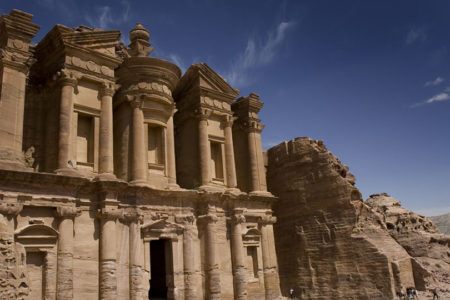
Entering the Millennium
First the Messiah will level the forces against Him in the Valley of Megiddo. Then He will usher in a new era. If you’re interested in how things will unfold, you’ll love this article.

Living in a Perfect World
Long life. No disease. Tame animals. These are merely a few characteristics of the Millennium. There are many more, some of which may even surprise you.

Subscription Options
1 year digital subscription, free pdf book download - "what on earth is god doing" by renald showers, free full-issue flipbook & pdf download of current issue.
$9.99 every 1 year
1 Year Digital with Archive Access
Free full-issue flipbook & pdf downloads of current issue & select archives, complete access to our growing archive - eventually dating back through our inaugural 1942 issue.
$19.99 every 1 year
2 Year Digital Subscription
$19.99 every 2 years
2 Year Digital with Archive Access
$39.99 every 2 years
3 Year Digital Subscription
$29.99 every 3 years
3 Year Digital with Archive Access
$59.99 every 3 years
Subscribe For Full Access
Flipbooks and PDF downloads are available to subscribers only. Subscribe now or log in for access.
Exclusive for Spurgeon.org: "A 14-Day Devotional to Grow in Your Faith" is a devotional comprised of articles written by Charles Spurgeon. Download your free copy today to be encouraged and edified in your morning devotional time.
Moses: His Faith and Decision
Charles Haddon Spurgeon June 24, 1888 Scripture: Hebrews 11:24-26 From: Metropolitan Tabernacle Pulpit Volume 34
“By faith Moses, when he was come to years, refused to he called the son of Pharaoh’s daughter; choosing rather to suffer affliction with the people of God, than to enjoy the pleasures of sin for a season; esteeming the reproach of Christ greater riches than the treasures in Egypt: for he had respect unto the recompence of the reward.”— Hebrews xi. 24— 26.
WE generally picture Moses with, beams of glory rising from his brow, and the two tables of the law in his hand; a stern man holding forth a sterner law. But we must correct our idea. Moses is as much an example of faith as he is a representative of law. What he did was as much due to his faith as were the acts of Paul or John. In describing Moses, the summary must begin “By faith,” as much as if we were describing Abraham. Continue to regard Moses as a representative of the law, but also view him as a man of wonderful and powerful faith.
I need scarcely remind you that the faith of Moses was peculiarly active and operative. I might apply the words of James to him, and say, “Likewise also was not Moses justified by works when he refused to be called the son of Pharaoh’s daughter, and chose to endure affliction with the people of God?” The faith of Moses was what ours must be, a faith which worked by love— even love to God, and love to his people. It was no mere belief of a fact; but that fact had an overpowering influence upon his life. Moses believed, believed firmly and intensely, believed for himself, so that he took fast hold of that which is invisible. Moses showed the reality of his faith in his life, by what he refused to do, and by what he chose to do. Both the negative and the positive poles were made right by his faith. Everything about Moses proved the truth and the vigour of his faith in God. He was second to none among those “who believed God, and it was accounted unto them for righteousness.” He was king in Jeshurun, and he was the greatest of law-givers; but yet he happily takes his place among believers who find their all in God. On the Arc de Triomphe which is raised in this eleventh chapter of Hebrews the name of Moses is written among the very greatest of those who lived by faith in God. I pray that while I am speaking this morning, faith may be wrought in some here present who have it not as yet; and I pray also that others who have true faith, but have not yet avowed it, may find themselves drawn to take a decided step, and take their place on the side of God and his people. The question, “Who is on the Lord’s side?” is the one I would press upon you this morning, in the hope that, like Moses, many of you may be willing to suffer the reproach of Christ, which has not ceased.
Our first remark shall be, Moses had faith; the second shall be, Moses exhibited clear decision as the result of his faith; and then, thirdly, we will say, Moses should be imitated by us.
I. First, then, MOSES HAD FAITH. I am not going through the whole life of Moses, that were much too large a theme for one discourse; but I shall very much keep to my text.
It is very clear that Moses believed in God. He was learned in all the learning of the Egyptians, he had been brought up in the very best academies of the period; but he had not been seduced from faith in his God. There were gods many in Egypt; but Moses worshipped the one God, the God of his fathers; and though he may have known comparatively little of him, he knew enough to have no other God but the God of Abraham, Isaac, and Jacob. I suppose that his mother and father could tell him but little of the family faith; but as they were God-fearing, believing people, they taught him what they knew. He believed in the living God, Creator of heaven and earth; he worshipped one God, the ruler of providence; one God, who is to be obeyed and adored; and to this God he adhered. I would that all of you believed in the living, personal, working, ever-present God! In these days many do not believe in a personal God, but in some sort of force or mystic energy, they know not what. This is virtually to have no God at all. To Moses the existence and ruling power of God were the greatest facts of life. He believed in the one living and true God, bowed before him, desired to be found serving him, and to have him as his friend, even though this should put him into opposition with all the world. Although the pomp, and power, and glory, and wisdom of the ruling nation were all on the side of idols, Moses worshipped the one God; for in his power and Godhead he solemnly believed.
In the next place, Moses believed that the Israelites were the chosen people of God. This, of course, he had learned from his parents, and he heartily believed it, though it certainly did not look to be true. If the seed of Jacob were the people of God, why were they left under oppression? Why were they enslaved by Pharaoh? Why were their children doomed to die? Could the elect of God be left in so evil a plight? If God be the God of this people, why are they made to endure affliction? Peradventure they told him that God had revealed unto their fathers, that they were to go down into Egypt, and to be strangers in a strange land; but whether or not, it was the solemn conviction of Moses that the living and true God had chosen the seed of Abraham to be his people, and had taken them into covenant with himself. They were the election of grace. For this cause Moses loved them, and desired to be numbered with them. Certainly, they were not in themselves a very lovable people: there was much about them that must have saddened the heart of Moses. They were ignorant, while he was educated: they had been debased by slavery, while he was of that brave disposition which is nourished in freedom. When he himself attempted to be their champion, they did not receive him. He found two of them striving together, and when, with gentle words he would have made peace between them, one of them replied, “Who made thee a prince and a judge over us?” Yet Moses said to himself, “Whatever they may be, they are the people of God, and I will be one of them.”
Even to this day the Lord has a chosen people, a remnant according to the election of grace. Looking critically at the church of God, we soon detect much that is faulty, many shortcomings and many grievous evils; yet the church of God is God’s choice, and we may not. despise it. I can say of God’s people—
“These are the company I keep; These are the choicest friends I know.”
If they are good enough for God, they are good enough for me. If you never join a church till you find a perfect church, you must wait till you get to heaven; and if you could go there as you are, they would not receive you into fellowship. Consider who are the people that acknowledge God in their lives, who hold the truth as it is revealed, who believe the Holy Scriptures, and worship God in the Spirit, having no confidence in the flesh. Cast in your lot with these people, however poor and common-place they may be. If they are not all you would like them to be, neither are you yourself all you would like to be; but simply, because you believe them to be the people of God, cast in your lot with them, begging the Lord to have mercy upon you, and deal with you as he is wont to do to those who fear his name.
Moses further believed that the reproach which fell upon his people was the reproach of Christ. It is said that he “esteemed the reproach of Christ greater riches than the treasures in Egypt.” But Christ was not there. Christ as yet had not been born into the world. How could the reproach of Israel in Egypt be the reproach of Christ? This shows us that the Christ was always one with his people. Even as the church is the body of Christ now, so were the Lord’s people the body of Christ of old. The Lord Christ so sympathized with Israel in Egypt, that what they bore he bore. “In all their affliction he was afflicted, and the angel of his presence saved them.” Jesus is that “angel of his presence.” Brethren, it is a grand thing to discover and know by faith that the reproach which falls upon the people of God is the reproach of Christ. When Stephen was killed, it was Stephen, was it not, that died? Ay, but the Christ stood up from his throne that day. When Christ spoke to Saul on the road to Damascus he did not say, “Saul, Saul, why dost thou persecute the church?” but, “why persecutest thou me?” Christ suffers in the least of his people. The poorest and the most obscure of them, when ridiculed and put to scorn for his sake, is not alone in his grief: the head suffers in the members. The reproach of believers is really the reproach of him in whom they believe. The reproach of Israel is the reproach of Christ, and Moses believed this. “Ah!” said he, “whatever they say against these people, and whatever they do against them, they are really saying and doing against the Lord’s anointed.”
Furthermore, Moses believed it to be wisest to be upon the side of God. “He had respect unto the recompence of the reward.” Adding all things up and making a deliberate calculation of the whole business, he believed that it must be right and wise to stand on that side which was in agreement with the living God. He made up his mind that he would be where the Lord was. Now, dear friends, that is a wise conclusion to come to: is it not? Should we not be on the side of God? We are his creatures, should we contend with our Creator? He has been infinitely good to us, ought we not to side with our Benefactor? All that he does is right, all that he permits is just, all that he advocates is pure; should we not be on that side? The other side is the side of evil and darkness, the side of the devil: should we be found there? I trow not. O young man, it will be your glory to be upon the side of God. O young woman, it will be your beauty to espouse the cause of Christ. What can become of us if we are opposed to God, the good and true? Shall the tow contend with the flame, or the wax with the fire? If we are on the side of God, we are on the right side; and being on the right side, we shall have peace of conscience, and rest of heart. The right must ultimately win the day; but even if it were not so, a brave heart is content with being right. Is it just? Is it true? Then put down my name as a soldier in that army.
It must be well to be upon the side of God, because God’s worst is better than the world’s best. Did you notice how Moses put it? He brings forth affliction, and he esteems it to be better than the “pleasures of sin.” Now, pleasures are certainly better than afflictions, according to any ordinary judgment; but Moses came to this conclusion, that although affliction might be God’s worst, it was better than the pleasure of sin, which is evil’s best. He mentions reproach, which is one of the bitterest kinds of affliction, for many a man can bear pain, but cannot bear ridicule. Moses set down reproach, and he counted it to be better than the treasures in Egypt. Yet the treasures in Egypt were the best things in Egypt— its gold, its horses, its fine linen, and the many things that made Egypt famous. I say he put all these down in the schedule, and then preferred the reproach of Christ to them all. God’s fast is better than Egypt’s feast. Thus he calmly and deliberately made his decision, and said, “I throw in my lot with the people of God. I take their God to be my God, and where my duty to God may call me, there will I go.”
Next, dear friends, note this— Moses had faith in a future judgment. He looked beyond the present; for he “had respect to the recompence of the reward.” It is dangerous to be always looking at things from one point of view. If we could go quite round, and see things from the future, looking back upon them rather than forward to them, how different they would appear! “Oh!” said a lady to her minister, “I find great pleasure in going to the play. There is the pleasure of anticipation, there is the pleasure of enjoying it, and there is the pleasure of thinking it over afterwards.” “Yes,” said her minister, “I know all that, madam; but there is one pleasure you have forgotten, namely, the pleasure of meditating upon it on a dying bed.” She shrugged her shoulders, she could see no pleasure there. I wish that men would estimate their pleasures by that rule. How will they look when we lie dying? How will they appear when we stand before the judgment seat of God? When I have once come into eternity, and have to spend it according to the final sentence, how shall I look back upon what I have done? As a Christian man, how shall I look back upon wasted opportunities and idleness in my master’s vineyard? As an unbeliever, how shall I regard wasted Sabbaths, rejected entreaties, a neglected Bible, a disregarded mercy-seat? If we could only view things in that clear light which beats about the eternal future we should avoid a thousand mistakes. View the course of life as Moses did, in connection with the recompence of the reward, and a resolve will be taken which will make you commence a life for God and holiness.
Let me not quit this point till I have said that Moses had a personal faith by which he realized the whole business for himself. He did not say, “Yes, there is a God undoubtedly, and these are God’s people, and there is an end of it;” but he said, “There is a God for me to worship, for me to trust, for me to obey. Here are God’s people; I resolve to be numbered with them. Their God shall be my God. I will be one of the sheep of his pasture, and take my part with his flock; if they suffer, I will suffer with them; if they rejoice, I will wait to rejoice till they rejoice.”
His faith led him on to personal action. He did not say, “I am placed by providence in the palace of Pharaoh, and so I am not called upon to suffer like the rest of my race.” No, no, but he refused to be called the son of Pharaoh’s daughter. He did not say, “I am so circumstanced that I need not suffer, and therefore I will keep out of the general trouble as well as I can.” You know how men feel, that there is nothing like keeping on the warm side of the hedge. Moses resolved that he would suffer affliction with the people of God. Moses would be on a level with his brethren. He declared himself to be one of the despised nation. The reproaches of them that reproached Christ in his people fell upon him.
This was the faith of Moses, a real personal faith. Come, dear friends, ask yourselves, have you all such a personal faith in God? I tell you, if your faith is not personal and practical faith, it is not worth twopence. It will do you no good, either here or hereafter. It will leave you lost to God if it leaves you still a friend to the world, and an alien from the people of God. Oh, that you may say from your heart, “This God is my God for ever and ever. He shall be my Guide even unto death.”
Faith in Moses was the foundation of the whole building of his life. Hast thou faith? then every good thing will come of it. Hast thou no faith? then thou hast no beginning from which a happy end can come. How canst thou read thy title clear to mansions in the skies, when thou dost not, as yet, know the first letters of the alphabet of grace? Thou canst never build up a character such as God will approve; for thou hast not even laid the first corner-stone of faith.
II. Our second point is this: MOSES EXHIBITED A CLEAR DECISION. Oh, that the Spirit of God would work the like in all of us!
Note, first, the time of his choice: “When he was come to years.” We do not know the exact time to which this refers. When he was forty years of age he visited his brethren, but his mind may have been made up long before. It was “when he was come to years.” I suppose that means early in life, so soon as he was of full age. Why not earlier still? He was in Pharaoh’s court under many influences, which may have prevented an earlier confession. We are not sure that God had yet spoken to his heart, so as to make him feel the importance of following the Lord fully. Anyhow, it was in early life that he declined the world and chose his God. It is a grand thing for young people to decide for God soon: it will save them from a thousand mistakes, and bring them a thousand advantages. Early piety leads on to eminent piety: he who begins his journey early travels far in the day. The great bulk of those who have distinguished themselves in the church of God will be found to have been converted while they were yet young. “When he was come to years.” Does some youth here claim that he has not yet come to years? I answer— Is this so? Why, the other day you were demanding of your father certain liberties because you felt yourself quite the man; I find that lads nowadays become men earlier than they used to do. I wish they would take upon themselves ripe responsibilities as well as covet ripe privileges. Oh that they would act as Moses did when he came to years! If you feel you have come to years in one way, own that you have come to years in another way; and say, “Now is the time when I must come right straight out and be a Christian man.” You young women who do not care to be called girls any longer, I pray you give your hearts to Christ; the sooner you are decided the better.
Still it is said, “when he was come to years,” as much as to say, that whatever his decision was while he was yet young, that decision was carried out more practically when he was come to years. We do wish to see young people converted, but we wish it to be as thoughtful a conversion, as clear and deliberate a change as if they were advanced in age. We trust that their following years will confirm what they do in their youth. Now, what say you, men and brethren of mature years? If you could lay aside your religious profession and begin again, would you still make to-day the decision which you arrived at when you were young? Oh yes, we can say, and do say— We have lifted our hand unto God, and we cannot go back; and instead of wishing to go back, we lift both hands now, and cry—
“’Tis done, the great transaction’s done, I am my Lord’s, and he is mine.”
We do not wish to retreat from the covenant of our youth, or draw back from the bond of our baptism into Christ of long years ago. We repeat the vow, and cry, “Bind the sacrifice with cords, even unto the horns of the altar.” Moses decided for God early in life; but he also decided when he was capable of forming a mature and deliberate judgment.
Moses went about arranging his life like a man of business, and decided wisely; but we must note well the prospect which he gave up. He “refused to be called the son of Pharaoh’s daughter.” To be the son of Pharaoh’s daughter made him a prince of Egypt. Some have thought that the Pharaoh then reigning had no other child but this daughter, and that her son Moses would have succeeded to the throne of Egypt. We cannot be sure of that, though it may have been so. The son of a princess has noble rank and grand opportunities. Wealth was evidently to be had: the treasures of Egypt were before him. Honour was his already, and as he grew older titles would multiply upon him. But he said firmly, “No; I cannot be an Egyptian. I am an Israelite, and I prefer the privileges which come to me from Father Abraham to those which come by Pharaoh’s daughter. I cannot relinquish my part in the promise and the covenant, but I can and will relinquish all the honours which come of Pharaoh’s court.” He did so: deliberately did so. “He refused to be called the son of Pharaoh’s daughter.”
A great many would say— What a fool he was to give up what others covet! I fear that many of you professors would not lose a situation for Christ. Some of you could not lose a shilling a week of extra pay for the Lord. Ah me, this is a miserable age! Go with a lancet throughout these Isles, and you could not get enough martyr-blood to fill a thimble. Backbones are scarce, and grit is a rare article. Men do not care to suffer for Christ; but they must be respectable, they must vote in the majority, they must go with the committee, and be thought well of for their charity. As to standing up and standing out for Christ, it is looked upon as an eccentricity, or worse. To-day if a young man proposed to sacrifice his position for Christ’s sake, father, and mother, and friends would all say: “Do not think of such a thing. Be prudent. Do not throw away your chance.” Once men could die for conscience sake: but conscience is nowadays viewed as an ugly thing, expensive and hampering. No doubt many advised Moses to be called the son of Pharaoh’s daughter, but he steadily refused. He deliberately divested himself of his rank that he might be numbered with the down-trodden people of God.
For a moment, I will show you some of the arguments which Moses must have had to meet. In his own mind, when having come to years, he began to think the matter over, many arguments would arise and demand reply. The first argument would be, “You will be acting very unkindly to your adopted mother— What will she say? She drew you out of the water when you might have been drowned; she took you home, she saw that you were nursed and cared for, she has had you trained and educated. She has spent no end of money on you; there is nothing you could wish for but what she has supplied it: her heart is entwined in yours: and now, having come to years, if you refuse to be called her son, it will be a very sad return for her love.” Natural affection has often proved a serious difficulty in the way of grace. The Lord Jesus has said, “He that loveth father or mother more than me is not worthy of me; and many are thus unworthy.” In the case of Moses, a sense of honour would join with affection. He knew that it was right to refuse to be the son of Pharaoh’s daughter; but still, there was something to be said on the other side; for how could he disown a tie which the hands of love had fastened? Could he rend that fond connection? Could he persist in saying, “I am no Egyptian”? I doubt not that he felt, “I should be playing the hypocrite if I professed to be of Egypt, and I must tell the princess as gently as I can, but still most firmly, that I cannot be called by her name; for I am the son of Amram, of the tribe of Levi, of the seed of Jacob.” Moses was an Israelite indeed, and he would not conceal his nationality nor renounce it by becoming a naturalized Egyptian. Though it should tear the heartstrings of his foster-mother, and be even as a sentence of death to himself, yet he would take his stand. Moses thus proved his faith to be stronger than that of many who are mastered by family ties, and held captive by the bonds of earthly love. Unequal yoking is the ruin of thousands. The friendship of the world is the blight of piety. Happy are they who love Jesus more than all!
Next, there would come before the mind of Moses the plausible argument, “Providence has led you where you are, and you ought to keep your position.” When Moses looked back he saw a remarkable providence watching over him in the ark of bulrushes, and bringing the Egyptian princess down to that particular part of the Nile to bathe. How singular that she should see the ark, and save the life of the weeping babe! Could he fly in the teeth of providence by relinquishing the high position so specially bestowed? Thus would flesh and blood reason. How often have I heard people excuse themselves for doing wrong by quoting what they call providence! Arguments from providence against positive commands are ingenious deceptions. Providence is of God, but the lesson which we draw from it may be of the devil. When Jonah wanted to flee to Tarshish he went down to Joppa, and found a ship going to Tarshish. How providential! Nothing of the sort. When Cain killed his brother Abel was it providence which found the club? Whenever a man wants to do wrong he will find opportunities at hand; but let him not excuse his wickedness by the apparent opportunity for it. Be afraid of that kind of providence which makes sin easy. When a providence comes across you in doing right, do not give over your gracious purpose, but know that it is sent to try you, whether you can serve the Lord under difficulty. A providence which chimes in with your natural inclination may be a stone of stumbling by which your hypocrisy will be made clear. Moses felt that providence did bring him into Pharaoh’s court, but he also felt that it brought him there that he might be put to the test to see whether he would come out of it for the Lord’s sake. Do not believe in the reasoning which suggests that providence would have us slide along an easy, though evil, way. Providence, if it be read aright, never tempts to sin, though it may put before us trials for our faith. Our rule of life is the commandment of the Lord, not the doubtful conclusions which may be drawn from providences.
Yet another argument may have met Moses, for it is one which I have heard repeated till I am sick of answering it. Moses could do a deal of good by retaining his position. What opportunities for usefulness would be in his way! See how he could help his poor brethren! How often he could interpose at the court to prevent injustice! Moreover, what a bright fight he would be in his high position: his example would commend the faith of the true God to the courtiers and great ones; nobody could tell what an influence would thus be exercised upon Egypt. Pharaoh himself might be converted, and then all Egypt would bow before Jehovah. Thus have we met with brethren who say, “Yes, I am in a church with which I do not agree; but then, I can be so useful.” Another cries, “I know that a certain religious Union is fostering evil; but then, I can serve the cause by staying in it.” Another is carrying on an evil trade, but he says, “It is my livelihood; and besides, it affords me opportunities of doing good!” This is one of the most specious of those arguments by which good men are held in the bonds of evil. As an argument, it is rotten to the core. We have no right to do wrong, from any motive whatever. To do evil that good may come is no doctrine of Christ, but of the devil. Fallen nature may maunder in that way, but the grace of God delivers us from such wicked sophistry. Whatever good Moses might have thought that he could do in a false position, he had faith enough to see that he was not to look to usefulness, but to righteousness. Whatever the results may be, we must leave them with God, and do the right at all cost.
But, dear friends, do you not think that Moses might have made a compromise? That idea is very popular. “Now then, Moses, do not be too strict. Some people are a deal too particular. Those old-fashioned puritanical people are narrow and strait-laced: be liberal and take broader views. Cannot you make a compromise? Tell Pharaoh’s daughter you are an Israelite, but that, in consequence of her great kindness, you will also be an Egyptian. Thus you can become an Egypto-Israelite— what a fine blend! Or say an Israelito-Egyptian— with the better part in the front. You see, dear friends, it seems a simple way out of a difficulty, to hold with the hare and run with the hounds. It saves you from unpleasant decisions and separations. Besides, Jack-of-both-sides has great praise from both parties for his large-heartedness. I admire this in Moses, that he knew nothing of compromise; but first he refused to be called the son of Pharaoh’s daughter, and secondly, he made a deliberate choice rather “to suffer affliction with the people of God, than to enjoy the pleasures of sin for a season.” My hearers, come out, I pray you, one way or the other. If God be God, serve him; if Baal be God, serve him. If it is right to be an Israelite, be an Israelite; if it is right to be an Egyptian, be an Egyptian. None of your trimming. It will go hard with trimmers at the last great day. When Christ comes to divide the sheep from the goats, there will be no middle sort. There is no place for trimmers. Modern thought is trying to make a purgatory, but as yet the place is not constructed, and meanwhile you border people will be driven down to hell. May God grant us grace to be decided!
Notice the lot which Moses chose. He refused to be called the son of Pharaoh’s daughter, but he chose to take his portion with the oppressed, reproached, and ridiculed Israelites. I want you to see the terms in which his judgment is expressed; for no doubt the Holy Spirit tells us exactly how Moses put it in his own mind. He chose rather to suffer “affliction with the people of God.” Does not that alter it wonderfully? “Affliction” nobody would choose; but “affliction with the people of God,” ah! that is another business altogether. “These are they which came out of great tribulation, and have washed their robes, and made them white in the blood of the Lamb.” I choose the “great tribulation,” not because I like it, but because these came out of it, and have “washed their robes and made them white in the blood of the Lamb.” “Affliction with the people of God” is affliction in glorious company. I was reading the other day the life of John Philpot, who was shut up in Bishop Bonner’s coal-hole in Fulham Palace. There he and his friends sang psalms so merrily that the Bishop chided them for their mirth. They could have quoted apostolical authority for singing in prison. When there were seven of them, Philpot wrote: “I was carried to my Lord’s coal-house again, where I, with my six fellow prisoners, do rouse together in the straw as cheerfully, we thank God, as others do in their beds of down.” To be with the people of God, one would not mind being in the coal-hole. No one wants to be in Bonner’s coal-hole; but better be there with the martyrs than upstairs in the palace with the Bishop. To hear the saints’ holy talk, and sing with them their gladsome psalms, and with them behold the angel of the covenant, is a very different thing from mere suffering or imprisonment. “With the people of God”: that is the sweet which kills the bitter of affliction. Nobody here wants to go into a burning fiery furnace; but none of us would refuse to be there with Shadrach, Meshach, and Abednego, and that “fourth” who was “like unto the Son of God.” I admire this in Moses, that he does not look at half a thing; he views it all round, and, having seen it all, he forms his judgment. He did not choose affliction for its own sake, but affliction with the people of God he preferred to the pleasures of sin.
Note the next expression: “Esteeming the reproach of Christ greater riches than the treasures in Egypt.” Nobody desires reproach for its own sake; but “the reproach of Christ” is a very different matter. That gives a new flavour to it. Nobody wants to stand up in yonder pillory, where everybody is hurling mud and filth at the object of their scorn; but tell me that the sufferer is the Lord Jesus Christ, and I will find you a host of volunteers to stand with him and gather honour by sharing in his dishonour. “The reproach of Christ.” Why, that is glory! Thus Moses placed things in their right light, and they seemed to undergo a complete change.
Now, notice what he said about the baits upon the other side: “Choosing rather to suffer affliction with the people of God, than to enjoy the pleasures of sin for a season.” See! he calls the pleasures of the court “the pleasures of sin.” Why, Moses, you need not fall into vice. You could be an Egyptian, and yet be chaste, and honest, and sober, and just, and good. Yes, but he regards his proposed life as the son of Pharaoh’s daughter as full of “the pleasures of sin.” Now, mark this: If you believe in the Lord Jesus Christ, it becomes your duty decidedly to come out and stand on his side; and if you do not do so, the pleasures derived from your sin of omission will be the pleasures of sin. You are living a life of disloyalty to Christ, and that is a life of sin. “Whatsoever is not of faith is sin”; that is to say, if you have not faith that you are doing right, you are doing wrong; and as Moses could not feel that he was doing right by being an Egyptian, whatever pleasure he might have gained from his remaining at court would have been “the pleasure of sin.” Then note the word, “For a season.” Did you hear the tolling of a bell? It was a knell. It spoke of a new-made grave. This is the knell of earthly joy— “For a season!” Honoured for doing wrong— “For a season!” Merry in evil company— “For a season!” Prosperous through a compromise— “For a season!” What after that season? Death and judgment.
Note once again, that Moses spoke about treasures; and as a great man in Egypt, he knew what wealth there was in the land; but he qualifies the treasures by saying, “treasures in Egypt.” For an Israelite those treasures were nothing, since they were in a foreign land. Treasures in the land that floweth with milk and honey— these were real treasures; but treasures in Egypt were a mockery. Moses shakes his head at them. He esteemed the reproach of Christ greater riches than the treasures in Egypt. So, you see, most deliberately, with great discrimination, Moses made his choice and kept to it, and God blessed him in it. He was preserved in the ark of grace from the hand of the enemy, and was drawn out of the waters of temptation to be consecrated to the high service of God.
III. I want, in the last place, hurriedly to say that MOSES SHOULD BE IMITATED BY US.
First, brethren, we should have Moses’ faith. The things which Moses believed are true; and therefore ought still to be believed. They are as important to-day as when he believed them; let us lay hold upon them, and feel their practical bearings this very morning. Young men especially, I entreat you to believe in God, and in his work of grace among his people, that you may be numbered with his chosen now, and in the day of his appearing.
Next, we must imitate Moses in this, that if we do believe we must come out on the Lord’s side. Now that you have “come to years,” do let it be seen on whose side you are. Let there be no doubt, no hesitation, no vacillation; but let those who see you in the house or in business know that you are on the Lord’s side.
Let me exhort you also to see things in the eternal light. Do not look at things in their bearings upon to-day, or to-morrow, or the next few years. Judge by eternity. For the present the good man may be a loser. You must look further than your foot. Take the measuring line of the sanctuary, and use it when you judge of spiritual things.
Note another important matter: I pray that you may get into fellowship with Christ. Oh to know Christ and love him, to have him to be your Saviour, and then to feel that you can wear the reproach of Christ as a Chain of gold! This is a great help in the life of a tried child of God.
Dear friend, if you are a believer in Christ, give yourself up to God without reserve: say, “I will follow thee, my Lord, through flood or flame. I will follow thee up hill or down dale. I will follow wherever the Lord shall lead the way. I will follow at all cost and hazard.” Say this in your soul. Take God for your all in poverty and disgrace. Take God on the bleak winter’s day, and say: “I am resolved, God helping me, to do his will.”
If you do this, you cannot tell what God has in store for you, nor need you give it a consideration. Moses, after all, was not a loser by his self-denial. He became King in Jeshurun, and was more than a monarch in the wilderness. He refused to be Pharaoh’s son, but in the Book of Exodus God said to him: “See, I have made thee a god to Pharaoh.” Egypt’s haughty monarch feared his plagues, and entreated his intercession. The Lord made Moses so great, that among those who are born of woman he ranks among the first unto this day. Even in heaven he is remembered; for they sing “the song of Moses the servant of God and of the Lamb.” Young man, if you give yourself unto the Lord you can little guess what he will do with you. What you lose will be a mere trifle compared with what you will gain. As to honour, all honour and glory lie in the service of the Most High.
I am come to this pass, my brethren— whether I sink or whether I swim, I am the Lord’s! By his grace I will believe his Word and cling to its inspiration, whether the Lord shall roll away my reproach or not. I would say with the three holy children, “Our God whom we serve is able to deliver us from the burning fiery furnace, and he will deliver us out of thine hand, O King. But if not, be it known unto thee, O King, that we will not serve thy gods, nor worship the golden image which thou hast set up.” With Job my heart has said: “Though he slay me, yet will I trust in him.” Be this the resolve of each one, for Christ’s sake. Amen.
Related Resources
All or none; or, compromises refused: a sermon with five texts.
All or None; or, Compromises Refused: A Sermon with Five Texts I SHALL have five texts— one of them a good one, the other four bad.The first text is good. It is God’s text. Exodus x. 26:— “There shall not an hoof be left behind.” That is God’s text, and the whole sermon will illustrate it …
Exodus:8:25-28
Moses: His Faith and Decision “By faith Moses, when he was come to years, refused to he called the son of Pharaoh’s daughter; choosing rather to suffer affliction with the people of God, than to enjoy the pleasures of sin for a season; esteeming the reproach of Christ greater riches than the treasures in Egypt: for …
Hebrews:11:24-26
The Death of Moses
The Death of Moses “So Moses the servant of the Lord died there in the land of Moab, according to the word of the Lord.” — Deuteronomy xxxiv. 5. WHAT an honourable title! Moses is distinguished as “the servant of Jehovah.” He was this of choice, for he willed to be the servant of God rather than …
Deuteronomy:34:5
On Whose Side are You?
On Whose Side are You? “Then Moses stood in the gate of the camp, and said, Who is on the Lord’s side? let him come unto me.”— Exodus xxxii. 26. DURING the last few days in which the stir of a general election has moved the most quiet of our streets, everyone of you must have been …
Exodus:32:26
- Midwestern Seminary
- Spurgeon College
- For the Church
- The Spurgeon Center
- Center for Public Theology
- Jason K. Allen
- Practice With Us
- Our Teachers
- Daily Meditations
- Online Education
- The Living School

Exodus: The Journey of Faith
Great themes of scripture: hebrew bible.
Exodus: The Journey of Faith Tuesday, June 29, 2021
The journey of Exodus, the journey that Israel walked, is an image of the journey made by every person who sets out to seek the Divine Presence. Israel is, as it were, humanity personified, and so what happened to Israel is what happens to everyone who sets out on the journey of faith. Christianity must recognize itself as an inclusive religion from the very beginning, and honor its roots in Judaism.
In the book of Exodus, Egypt is the place of slavery and the Promised Land is the place of freedom. The journey from Egypt to the Promised Land—through the Red Sea to Sinai and across the desert—is a saga which symbolizes our own struggle towards ever greater inner freedom, empowered by “grace.” The story of Israel symbolically describes the experience of our own liberation by God—and toward a universal love.
For enslaved African Americans who knew the book of Exodus, this journey of faith became more than a symbol. It became a journey of liberation from the exploitative system of slavery. As the Black theologian James Cone described, “The record shows clearly that black slaves believed that just as God had delivered Moses and the Israelites from Egyptian bondage, he also will deliver black people from American slavery. And they expressed that theological truth in song:
Oh Mary, don’t you weep, don’t you moan, Oh Mary, don’t you weep, don’t you moan, Pharaoh’s army got drownded, Oh Mary, don’t you weep.” [1]
The stories of Exodus make religious sense to people only to the degree that they are themselves walking a journey of faith. If we are walking in the Spirit and listening to the Spirit, we can rather easily relate these stories to our own life and identify with the experience of Israel.
We all have to turn to God and let ourselves be led on this faith journey. We have to be willing to experience the Exodus in our own lives, to let God take us from captivity to freedom, from Egypt to Canaan, not fully knowing how to cross the huge desert between the two.
Moses takes the risk of faith. All that God has given him is a promise, and yet he acts on that promise. People of faith are the ones who expect the promises of their deepest soul to be fulfilled; life for them becomes a time between promise and fulfillment. It is never a straight line, but always three steps forward and two backward—and the backward creates much of the knowledge and impetus for the forward. (Little did I know this would become my much later book, Falling Upward .)
Like the Israelites, we will find that the desert is not all desert. The way to the Promised Land leads to life even in the midst of the desert. When we least expect it, there is an oasis. As the Scriptures promise, God will make the desert bloom (Isaiah 35:1).
References: [1] James Cone, God of the Oppressed (Seabury Press: 1975), 11.
Adapted from Richard Rohr and Joseph Martos, The Great Themes of Scripture: Old Testament (St. Anthony Messenger Press: 1987), 19; and
“Exodus: The Journey of Faith,” The Great Themes of Scripture, tape 3 (St. Anthony Messenger Tapes: 1973).
Story from Our Community: These Daily Meditations are the first thing I read every day. I not only read the meditation but look at the picture, find any scripture passages referred to, research the guest authors, listen to the prayer, and practice the breathing exercises. Sadie, my golden retriever, seems more interested in being petted, constantly intercepting my hands from the computer. After my Daily Meditation, I devote time to her. The need for a church community has been more than satisfied by this experience. Thank you for all you do. —Wendy B.
Image credit: Jenna Keiper, Reflections II (detail), 2020, photograph, Albuquerque.
Image inspiration: these intertwined branches speak of the braided nature of biblical themes: mystery, hope, possibility, resilience, vulnerability and strength. although these leaves have seen better days, clouds carry hope for rain., this year’s theme.

Radical Resilience
We live in a world on fire. This year the Daily Meditations will explore contemplation as a way to build Radical Resilience so we can stand in solidarity with the world without burning up or burning out. The path ahead may be challenging, but we can walk it together.
The archives

Explore the Daily Meditations
Explore past meditations and annual themes by browsing the Daily Meditations archive. Explore by topic or use the search bar to find wisdom from specific teachers.
Join our email community
Sign-up to receive the daily meditations, featuring reflections on the wisdom and practices of the christian contemplative tradition..

Connect to God's Word like never before.
Download Bible Chat & Study today.

Moses in the Bible: A Journey of Faith and Leadership
The story of Moses is one of the most well-known and significant in the Bible. With his unwavering faith and guidance from God, Moses led the Israelites out of slavery in Egypt and into the Promised Land. In this article, we will explore the life of Moses, the challenges he faced, and the lessons we can learn from his story.
Moses' Early Life and Calling
Exodus 2:1-10 - birth and adoption by pharaoh's daughter.
Moses was born to Hebrew parents during a time when the Israelites were enslaved by the Egyptians. To protect him from being killed by the Egyptian decree, his mother hid him in a basket and placed it in the Nile River. He was found by Pharaoh's daughter and raised as her own son, living a privileged life in the Egyptian royal court.
Exodus 3:1-4:17 - The Burning Bush and God's Call
At the age of 40, Moses encountered a burning bush that was not consumed by the fire. It was through this divine encounter that God spoke to Moses, revealing Himself as the God of his ancestors. God called Moses to be the leader who would deliver the Israelites from their bondage in Egypt.
Moses' Challenges and Leadership
Exodus 5:1-9 - confrontation with pharaoh.
Following God's instructions, Moses and his brother Aaron confronted Pharaoh, demanding the release of the Israelites. Pharaoh refused, making their situation even worse by increasing their labor demands. This setback tested Moses' faith and leadership, but he continued to trust in God's plan.
Exodus 7:14-12:30 - The Ten Plagues
As a result of Pharaoh's hardened heart, God sent ten devastating plagues upon Egypt. These plagues were a demonstration of God's power and a judgment against the false gods of Egypt. With each plague, Pharaoh's stubbornness was challenged, eventually leading to the Israelites being set free.
Exodus 14:21-31 - Parting of the Red Sea
As the Israelites fled Egypt, they found themselves trapped between the Red Sea and Pharaoh's pursuing army. In a miraculous display of power, God instructed Moses to raise his staff, and the sea was parted, allowing the Israelites to pass through safely. When the Egyptians attempted to follow, the waters closed back, drowning the army.
Exodus 20:1-17 - The Ten Commandments
After leading the Israelites to Mount Sinai, Moses received the Ten Commandments from God. These laws would become the foundation of their covenant with God, guiding them in their relationship with Him and each other.
Lessons from Moses' Life
Hebrews 11:24-27 - choosing god over earthly comfort.
Moses chose to follow God's call, leaving behind a life of comfort and privilege in the Egyptian royal court. His decision teaches us the importance of putting our faith and relationship with God above worldly desires.
Numbers 12:3 - Humble Leadership
Moses was known for his humility, despite the power and authority given to him by God. As a leader, he demonstrated the importance of humility in serving others and relying on God's guidance.
Deuteronomy 34:10-12 - A Life of Faith and Obedience
Although Moses was not allowed to enter the Promised Land due to a moment of disobedience, his life was marked by faith and obedience to God. He serves as an example for us to trust in God's promises and follow His commands.
What is the story of Moses' early life and how was he called by God?
Moses was born to Hebrew parents during a time when the Israelites were enslaved by the Egyptians. His mother hid him in a basket in the Nile River to protect him from being killed by an Egyptian decree. He was found by Pharaoh's daughter and raised as her own son, living a privileged life in the Egyptian royal court. At the age of 40, Moses encountered a burning bush that was not consumed by the fire. It was through this divine encounter that God spoke to Moses, revealing Himself as the God of his ancestors. God called Moses to be the leader who would deliver the Israelites from their bondage in Egypt (Exodus 2:1-10, Exodus 3:1-4:17).
What challenges did Moses face during his leadership?
Moses faced several challenges during his leadership. He confronted Pharaoh, demanding the release of the Israelites, but Pharaoh refused and increased their labor demands (Exodus 5:1-9). God sent ten devastating plagues upon Egypt, demonstrating His power and challenging Pharaoh's stubbornness, which eventually led to the Israelites being set free (Exodus 7:14-12:30). Moses also faced the challenge of leading the Israelites safely through the Red Sea, which God miraculously parted for them (Exodus 14:21-31).
What are the Ten Commandments and how did Moses receive them?
The Ten Commandments are a set of laws given by God to Moses on Mount Sinai. These laws serve as the foundation of the Israelites' covenant with God and guide them in their relationship with Him and each other. Moses received the Ten Commandments after leading the Israelites to Mount Sinai, where he encountered God and was given the laws written on stone tablets (Exodus 20:1-17).
How did Moses demonstrate humility and faith in his leadership?
Moses demonstrated humility and faith in his leadership by choosing to follow God's call, leaving behind a life of comfort and privilege in the Egyptian royal court (Hebrews 11:24-27). Despite the power and authority given to him by God, Moses remained humble, serving others and relying on God's guidance (Numbers 12:3). His life was marked by faith and obedience to God, trusting in His promises and following His commands (Deuteronomy 34:10-12).
What lessons can we learn from Moses' life and leadership?
We can learn several lessons from Moses' life and leadership. Firstly, the importance of putting our faith and relationship with God above worldly desires, as Moses chose to follow God's call instead of enjoying his privileged life in Egypt (Hebrews 11:24-27). Secondly, the significance of humility in leadership, as Moses demonstrated the importance of serving others and relying on God's guidance (Numbers 12:3). Finally, Moses' life teaches us to trust in God's promises and follow His commands, despite facing challenges and setbacks (Deuteronomy 34:10-12).

Download our free app today.
If you want to learn more you can always get answers with our free Bible expert.

How to go to Heaven
How to get right with god.

Who was Moses in the Bible?
For further study, related articles, subscribe to the, question of the week.
Get our Question of the Week delivered right to your inbox!

The Story of Moses in the Bible: What His Life Teaches Us
A baby on death row, an outcast prince, a humble shepherd, and an unlikely deliverer. All these titles describe the individual that led Israel out of slavery in Egypt to the borders of the Promised Land.
This was the story of Moses in the Bible—a man who wasn’t even supposed to be alive, who allowed God to use him in mighty ways.
To understand him better and know why God fought so hard for him, we’re going to discuss:
- Who was Moses ?
- What kind of relationship did he have with God?
- What was his legacy?
You’ll learn about an incredible man—who may not be as different from you as you’d think!
Let’s dive in.
Who was Moses?
Moses is one of the most prominent figures in the Old Testament of the Bible. Scholars believe he lived during the 15th century BC. 1 Best known for leading the Hebrew nation, or the Israelites , from Egypt to Canaan. Though he is also credited as the primary author of the first five books of the Bible, also called by the Jewish people as the Torah or Pentateuch. His story is one of God fighting for him and his people, and molding him into a patient, self-sacrificing, faithful leader.
Here are some of the important highlights from his unique life.
Escaping death as an infant

Photo by Annie Spratt on Unsplash
Moses’ life started in hiding from the ruler of Egypt, who declared that all Hebrew baby boys be killed. But through the ingenuity of Moses’ mother, he survived and became part of the royal family.
Here’s how it happened.
A few hundred years before, the Pharaoh at the time allowed the Israelites to settle in Goshen, Egypt during a famine (Exodus 12:40). As time passed, they remained there as sheepherders and grew into a nation.
The next Pharaoh, however, felt threatened by this growth. So he found a way to enslave the people (Exodus 1:7–11).
But they continued to increase (verse 12).
Fearful of a revolt, Pharaoh turned to drastic measures. That’s when he commanded the murder of all male Israelite babies.
It was under this death threat that a Levite woman—named Jochebed—gave birth to a son and was determined to hide him (Exodus 2:1–2; 6:20).
She was successful for three months. But as her baby grew, she knew she’d have to do something else. So she weaved a little basket, placed her son in it, and hid the basket in the reeds by the Nile river bank (Exodus 2:3).
Who would discover the baby?
None other than the Egyptian princess (verse 4)! She recognized that the baby was “one of the Hebrews’ children” (verse 6, NKJV) and decided to adopt him, paying his mother to nurse him until he was older (verses 7–9).
The Egyptian princess “named him Moses, ‘because,’ she said, ‘I drew him out of the water’” (verse 10, ESV).
An outcast prince
Moses grew up in the Egyptian royal family with access to life’s best—a university education, the finest cuisine, and all the honor attributed to royalty (Acts 7:22). Above all, he was in line to the throne of Egypt. 2
But this was not to be.
Hebrews 11:24–25 recounts:
“By faith Moses, when he was grown up, refused to be called the son of Pharaoh’s daughter, choosing rather to be mistreated with the people of God than to enjoy the fleeting pleasures of sin” (ESV).
He wanted to share the sufferings of his people and free them from slavery. Perhaps he could use his position to do so.
One day, enraged over the poor treatment of a Hebrew slave, he murdered an Egyptian taskmaster and buried him in the sand. 3
Since Moses had taken matters into his own hands, he soon had to hide from Pharaoh again (Exodus 2:15).
A humble shepherd
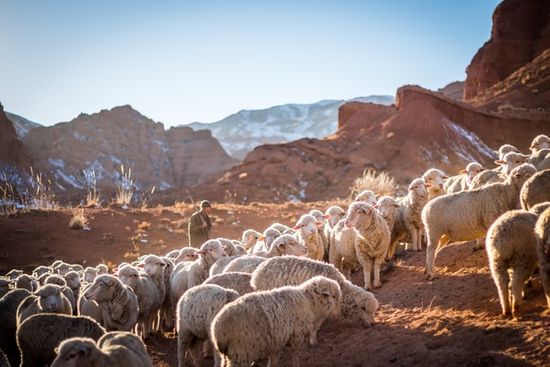
Photo by Patrick Schneider on Unsplash
At this point, Moses’ life had taken a different turn than he intended. A fugitive in the wilderness of Midian, he married Zipporah the daughter of Jethro, and spent 40 long years tending sheep (Exodus 2:15–21; 3:1). God knew that he needed those quiet years to prepare him to be an effective leader.
And it was as a shepherd that he would receive His special calling and mission.
An unlikely deliverer
God had big plans to redeem the Israelites from their wrongful enslavement. When the next Pharaoh was instated, God called Moses as the deliverer of His people (Exodus 2:23–25).
While tending sheep near a mountain called Horeb, Moses noticed something strange: a bush that was on fire but wasn’t burning up.
God spoke to him out of this burning bush, instructing him to lead the Israelites out of the land of Egypt and promising to be with him and guide him (Exodus 3:4–12).
Little did he know what that would entail. He accepted the position with great humility and even self-distrust.
A leader of Israel
At 80 years of age, Moses accepted God’s call to lead the Israelites out of Egyptian bondage. It would be no small feat, considering that Pharaoh was not going to easily give up his nation’s workforce. But God promised to use Moses and work miracles on behalf of the Hebrew people.
He worked through Moses in many ways, including:
- To confront Pharaoh and perform miracles through God’s power ( Exodus 5:1–3; 7:10–13)
- To declare ten different plagues that God would bring on the Egyptians ( Exodus 7–11)
- To part the Red Sea and lead the Israelites across ( Exodus 14:13–22)
- To guide the Israelites in their wilderness wanderings and mediate between them and God ( Exodus 16–17; 19:9; 20:19; 32:30–35)
- To act as a judge when disputes came up among the people ( Exodus 18:13–16)
- To relay the Ten Commandments and God’s other instructions ( Exodus 20–31)
- To direct the building and set-up of the sanctuary/tabernacle (Exodus 40; Leviticus 9)
They were tasks that required Moses to be intimately connected with God.
What kind of relationship did Moses have with God?
Moses had a very close relationship with God—one that he developed over his lifetime as he learned to trust God more and to trust himself less. He had to let go of pride in his own ideas so that he could depend completely on God’s plan.
The following are three facets of his relationship with God:
Communication with God
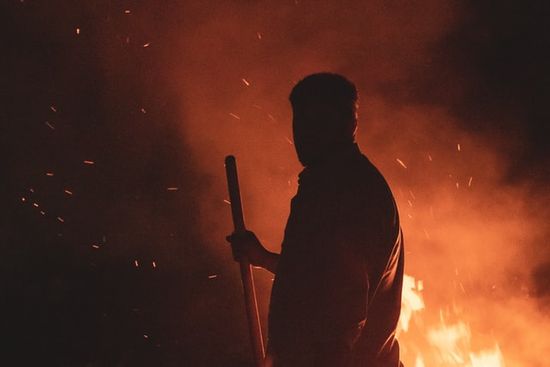
Photo by Ali fekri on Unsplash
As Moses came to know God better, he approached God in a way that showed he was in harmony with Him. He longed to know God and was willing to put himself on the line for the people of Israel. His communication with God reflected this attitude.
The first communication between him and God that is mentioned in the Bible takes place at the burning bush. Moses was caring for a flock of sheep when he encountered a bush on fire that wasn’t burning up. As he pondered the strange phenomena, God spoke to him from the burning bush, calling him to lead the people of Israel out of Egypt (Exodus 3:1–7).
But there’s more.
Exodus 33:11 tells us that “the LORD would speak to Moses face to face, as a man speaks to his friend” (ESV).
Moses had the opportunity to approach God on Mount Sinai—the “mountain of God”—and spend 40 days there communing with Him (Exodus 20:21; 24:1–2, 18). He even made a bold request to be able to see God’s glory (33:15–23).
Speaking of boldness, we can’t forget how Moses interceded on behalf of the Israelites when they rebelled against God (Exodus 32:30–34; Numbers 7:89):
He even went so far as to beg God to let him take on the consequences Israel deserved. And God preserved both Moses and the Israelites (Psalm 106:23).
Trust in God

Photo by Ezra Jeffrey-Comeau on Unsplash
Trusting God wasn’t easy for Moses, especially in the beginning. But his faith grew over time , and through many challenging circumstances.
At the burning bush, Moses questioned his own ability to speak and lead, even though God had promised to go with him and had given him miraculous signs to prove it (Exodus 4:1–9). Moses went so far as to say:
“Please send someone else” (verse 13, ESV).
But God was patient with his lack of faith and gave him his brother Aaron as a spokesperson (verses 10–17).
And his faith grew as he:
- Went before Pharaoh , demanding the release of the Israelites and declaring the plagues that would come ( Exodus 7:19–20; 8:1)
- Parted the Red Sea with his rod when it seemed like the Egyptians would capture the Israelites ( Exodus 14:13, 21)
- Cried out to Him in moments of distress ( Exodus 15:25)
- Dealt with the people’s complaints and struggles ( Exodus 15:22–26; 16–17)
- Lifted his rod in faith to God so that the Israelites would be victorious over the Amalekites (Exodus 17:11–12)
Even so, Moses was human. He struggled too. One of the biggest examples of this is the way he distrusted and disobeyed God in a moment of anger (Numbers 20:2–13).
The Israelites had been complaining about not having water, so God told Moses to speak to a rock and water would come out. Instead, he angrily struck the rock and “spoke rashly with his lips” (Psalm 106:33, ESV).
Because of his lack of faith, God didn’t allow Moses to enter the Promised Land (Numbers 20:12). But He had something greater in store for Moses: After his death, He resurrected him and took him to heaven—to the ultimate Promised Land (Matthew 17:1–3).
Despite Moses’ shortcomings, God helped him overcome many obstacles to become the man of faith that he was. We’ll look at those next.
Obstacles Moses overcame
Pride, impatience, and self-reliance were persistent obstacles Moses had to face during his lifetime.
When he was 40 years old, he thought God was going to use his military might and royal position to deliver the people of Israel (Acts 7:23–25).
Little did he realize how much he had to learn! He would have to wait 40 years in the wilderness as a shepherd, learning to trust God’s plans more than his own.
Those 40 years did their work. When God appeared to him at the burning bush (Acts 7:30), he recognized his smallness and incapability without God (Exodus 4:10).
He also became a servant leader—one who was willing to give his very life for those he was leading (Numbers 14:13; Exodus 32:30–34). He came to care about the people and God’s honor more than about himself.
This change in his attitude may be the very reason that the Bible says he “was a very humble man, more so than anyone on the face of the earth” (Numbers 12:3, CSB).
The legacy of Moses
Moses left behind a great legacy for the nation of Israel by leading them to the Promised Land. But he also left us a legacy in the many lessons we can learn from his experiences and relationship with God.
These lessons include:
- God has a plan for our lives from the very start.
- Delay and apparent failure aren’t necessarily the end of the story. They can be God’s ways of preparing us for greater things.
- God needs humble people.
- A true leader is a servant.
- Leaders need support.
And above all, his life pointed forward to the greatest servant-leader— Jesus Christ —who would come and sacrifice Himself for His people.
God has a plan for our lives from the very start
God was watching over Moses from babyhood, giving his mother wisdom to hide her son so that he could be preserved for God’s purpose.
Similarly, God has a purpose and calling for each one of our lives (Isaiah 43:1). And as we trust Him, He will guide us into that purpose.
Delay and failure aren’t obstacles for God. He can use every situation to strengthen us

Photo by Joshua Earle on Unsplash
Moses may have thought he was a failure when it came to delivering Israel. Even his own people didn’t support his attempts at first (Exodus 2:11–14). It wouldn’t be until after 40 years of herding sheep in the wilderness that God would call him to be Israel’s leader (Acts 7:30).
But in God’s eyes, that failure was not a dead end. And those 40 years were certainly not wasted.
If you find yourself at a point of failure, wondering why it’s taking so long to reach success, be encouraged by Moses’ experience. God hasn’t given up on you. In fact, He may be using the current circumstances to make you into the person the situation calls for.
God needs humble people
God used Moses’ 40 years in the wilderness to teach him the important lesson of humility. As he cared for sheep, he learned to trust in God’s plans instead of trusting his way of doing things. He also learned the importance of being teachable and taking advice from others (Exodus 18:14, 17).
God is likewise looking for us to be humble and teachable. James 4:10 promises:
“Humble yourselves before the Lord, and He will exalt you” (CSB).
When we’re humble, then God can help and empower us.
A true leader is a servant
Moses learned that true leadership is not about force and power; it’s about service and sacrifice. This lesson became so real in his life that he was willing to sacrifice himself when God had to confront the Israelites’ rebellion and disobedience.
When we seek leadership positions, do we have the same attitude of self-sacrifice?
Leaders need support
Leading a nation of people through the wilderness was a heavy burden for Moses to carry. But he didn’t do it alone. God provided him with people to support and counsel him in his work.
His brother Aaron was one of those individuals.
For example, when the Israelites fought against the Amalekites, Moses stood on a hill above the battle and held up his rod. As he kept his rod up, the Israelites were victorious. But as he would begin to grow tired, Aaron and another man named Hur “supported his hands, one on one side and one on the other so that his hands remained steady until the sun went down” (Exodus 17:12, CSB). Together, they were victorious.
Another support to Moses was his father-in-law, Jethro. When Jethro saw the burdens Moses had taken upon himself, he encouraged Moses to delegate his work to save his strength (Exodus 18:14–23).
The moral of these stories?
We were not meant to face life’s challenges alone. And so, God places us in communities where we can support one another—and be even more effective than if we tried to handle everything solo.
Moses’ life pointed to Jesus Christ

Photo by Pro Church Media on Unsplash
The greatest legacy Moses left behind was the way his life and character pointed to Christ . Notice what he said about the coming Messiah:
“The LORD your God will raise up for you a Prophet like me from your brethren. Him you shall hear in all things, whatever He says to you” (Acts 3:22, NKJV, see also Deuteronomy 18:15).
As a faithful servant of God in caring for the Israelites, he exemplified how Christ would be a faithful servant over all God’s people. An author of the New Testament reflects on this symbolism:
“Moses was faithful as a servant in all God’s household, as a testimony to what would be said in the future. But Christ was faithful as a Son over His household” (Hebrews 3:5–6, CSB).
Continuing the legacy of Moses
After hearing of near-death scenarios, the parting of the Red Sea, and encounters with God, you may think that Moses’ experience is far from your day-to-day.
Yet it’s not.
He was a human being—just like any of us—who struggled with doubts, fears, and failure . If God could use him, then God can use us!
The key is complete humility and trust in God. When we choose to depend completely on Him, He will:
- Bring us into that ever-deepening connection with Him
- Part the seas of impossibility in our lives
- Gain victories over the sins that attack us
- Use us to lead others out of the bondage in their lives
So take some time to get to know Moses in the Bible.
Immerse yourself in the lessons he learned.
Because you can continue the legacy he started.
1. DeCanio, Frank, “2. Analysis and Synthesis of Exodus,” Bible.org, March 27, 2012. [ ↵ ] 2. Ritenbaugh, Richard T., “What the Bible says about Moses as Part of Royal Family,” Forerunner Commentary, BibleTools.org. [ ↵ ] 3. Magonet, Jonathan, “Raised as an Egyptian, How Does Moses Come to Identify as a Hebrew?” TheTorah.com, 2021; Nelson, Ryan, “Moses: The Old Testament’s Greatest Prophet,” OverviewBible, July 27, 2020. [ ↵ ]
Questions about Adventists? Ask here!
Find answers to your questions about Seventh-day Adventists
More Answers


Major Fulfilled Bible Prophecies You Should Know About
Prophets seem like something from novels or movies. The predictions they make couldn’t actually happen, could they? After all, nobody can tell the future!

Why Do Some Bibles Have More Books Than Others?
Christians consider the Bible as their sacred writings. But within Christianity, different denominations use Bibles with different numbers of books.

Does the Bible Teach Predestination?
your choices, actions, and habits really matter to your eternal destiny? Or is the path you choose in life predetermined, and your life is just following a script that’s been laid out for you?
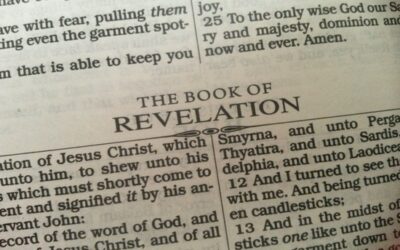
The Seven Churches of Revelation and What They Mean
The seven churches were churches that received messages from Jesus Christ through the apostle John while he was exiled on the island of Patmos. These letters are in chapters 2 and 3 of Revelation.
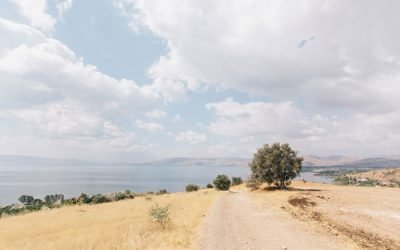
What Are the Beatitudes (And What Do They Mean)?
What Are the Beatitudes (And What Do They Mean)?The Beatitudes, found at the beginning of Jesus’ Sermon on the Mount in the Gospel of Matthew, are Jesus’ kingdom manifesto. They describe the way His kingdom works and what it means to be one of His followers. Even...

What Is the Fruit of the Holy Spirit in the Bible?
When we cultivate our relationship with Jesus, the Holy Spirit gives us traits that help us in our day-to-day activities and interactions. These are the fruit of the Spirit.

Bible Translations
Bible Translations—Which Version is “Best”?The most accurate Bible possible would be one that’s printed in its original languages—Hebrew and Greek. But since most of us are not Hebrew or Greek scholars, the next best option is an English Bible translation that most...
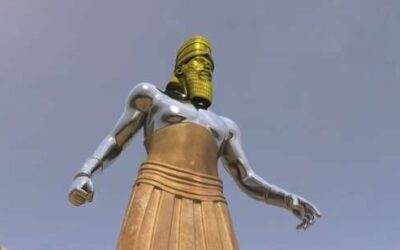
What Is the Statue in Nebuchadnezzar’s Dream?
Ever had a dream you couldn’t remember? You know it was disturbing, but the details escape you. Ugh, the frustration!

What Are the Three Angels’ Messages in Revelation 14?
The three angels’ messages prepare the people of the earth for the second coming of Jesus Christ. They tell us that a time of judgment is about to happen, and also gives us a glimpse into an imminent yet telling crisis—a crisis of allegiance and worship.

Is the Old Testament Important for Christians Today?
Yes, the Old Testament is important because it kicks off the story that is continued by the New Testament. Without it, we wouldn’t have the vital background to Jesus’ first coming and the other accounts of the New Testament.
![moses faith journey The Early Christian Church [Overview]](https://www.askanadventistfriend.com/wp-content/uploads/2023/01/old-temple-400x250.jpg)
The Early Christian Church [Overview]
The Early Christian Church describes the faith community that developed from followers of Jesus after He returned to heaven (Acts 1) in A.D. 31. Their purpose was to be witnesses of the life, death, and resurrection of Jesus and grow their faith community into a worldwide movement.

Individual or Group Bible Study—Which Is Better?
They’re both great, of course! But depending on where you’re at and what your goals are, it’s worth looking into the different benefits of each.

All About the 2300-Day Prophecy and the Investigative Judgment
Daniel 8:14 introduces us to the longest prophetic timeline in the Bible—the 2300-day prophecy. So what does it mean? When does it start and end, and why’s it so important?

Faith and Works—Do Both Matter in the Christian Life?
In so many religions all throughout time, individuals work toward enlightenment, salvation, or the favor of a deity. People are taught subtly—or not so subtly—that if you only do enough good deeds, you’ll be worthy/ascended/redeemed/approved, etc.

The Ultimate Guide to Personal Bible Study
Ever felt that studying the Bible is challenging, and you’re just not sure where to start? Or looking for fresh ideas to improve your current Bible study habits?
We’ve got you covered with simple techniques and plans to improve your Bible study experience.

What Is the 70-Week Prophecy in Daniel 9
Could a prophecy accurately predict an event over 500 years before it was supposed to happen? The 70-week prophecy of Daniel 9 did, culminating in one of the most important events in earth’s history: Jesus’ sacrifice for us on the cross.

King David: How Was He a Man After God’s Own Heart?
War, bloodshed, murder, adultery—all of these crimes overshadowed the life of a biblical Old Testament man named David. Yet he was called a man after God’s own heart, not to mention one of Israel’s greatest heroes and kings.

What Does the Bible Say About the End Times?
First of all, when we say “end times,” this refers to the period of time that precedes the second coming of Jesus—and the end of this sinful world before it’s recreated into the new earth. And several passages of Scripture provide us with clues and guidelines to help us recognize when these times are near, what kinds of things we can expect, and what it might mean for our daily lives and priorities.

The 42 Kings (and 1 Queen) of Israel and Judah in the Bible
Conspiracies, royal scandals, dictatorships—history is full of them. And Bible history is no different when we stop to look at the kings of ancient Israel in the Old Testament.

The Creation of the World: What the Bible Really Says
When we think about the biblical Creation story, we think of just that: the world being created by the Creator. And while God’s creation of the world is marvelous and miraculous in its own right, it’s about far more than the sudden appearance of plants, animals, and humans.
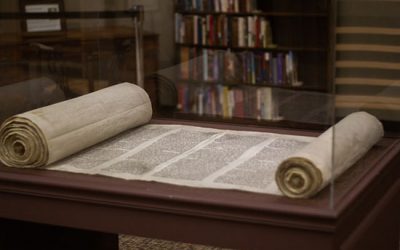
What’s the History of the Bible?
The Bible is the number one bestseller in the world of all time.1 It’s translated into thousands of languages, read by people of all ages and backgrounds.
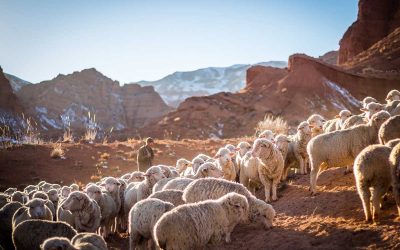
Who Were the Israelites in the Bible?
The Israelites in the Bible, also known as the children of Israel or ancient Israel, were a nation God called to represent Him to the world. As recorded in the book of Exodus, He delivered them from slavery in Egypt under Moses’s leadership and brought them to the Promised Land of Canaan (located in a similar area to present-day Israel).
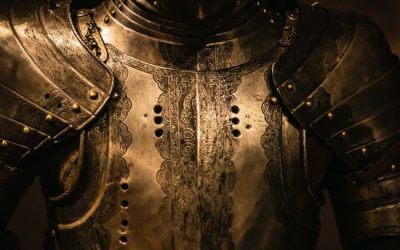
What We Can Learn from the Life of Joshua
Joshua was an iconic leader in the Old Testament of the Bible. As a successor to Moses, he was both a humble servant of God and a strong warrior. God called Him to lead the nation of Israel to take possession of Canaan, the Promised Land—a task he took on with faith and courage.
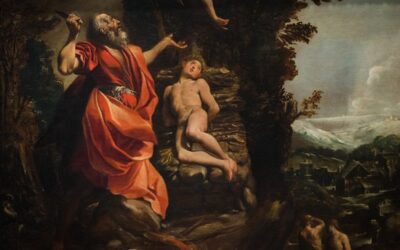
Why is Abraham Important in the Bible?
God communicated directly with Abraham and made a covenant with him that would provide land, protection, and fruitfulness for his descendants. And he indeed became the father of many nations, making him a foundational figure in three monotheistic world religions: Judaism, Islam, and Christianity (Genesis 17:5, 19-20; Genesis 25:1-6, 12-18).

Who Were the Judges of Israel in the Old Testament?
Times of crisis call for men and women of action. The Israelites, newly settled in the Promised Land, found themselves in those times. As enemy nations attacked and oppressed the tribes, they cried out to God for help. He, in turn, sent them men and women of action—known as judges.

The Armor of God as Described in Ephesians
In Ephesians 6, the Apostle Paul was helping people understand what it means to defend themselves within a spiritual war (Ephesians 6:10-18).
![moses faith journey What is the New Testament? [About Each Book and Key Lessons]](https://www.askanadventistfriend.com/wp-content/uploads/2022/02/new-testament-400x250.jpg)
What is the New Testament? [About Each Book and Key Lessons]
The New Testament is the second section of the Bible, describing Jesus and how He came to this world to reveal the love of God. It tells about His ministry, His death and resurrection, and the church that resulted.

Healing in the Bible
Have you ever felt like healing seemed so far away? Like it wouldn’t be possible for you? What you most want is a glimmer of hope or a bit of encouragement.
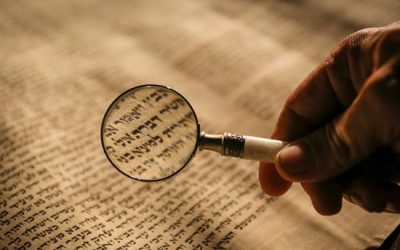
All about the prophets in the Bible
Prophets were individuals in the Bible who received messages from God and communicated those messages to the recipients—whether through speaking or writing. Their writings, known as prophetic books, comprise a huge part of the Bible.
Didn’t find your answer? Ask us!
We understand your concern of having questions but not knowing who to ask—we’ve felt it ourselves. When you’re ready to learn more about Adventists, send us a question! We know a thing or two about Adventists.
- Community Learning
- JTS Torah Archive
Moses’s Journey, and Ours

- Subscribe to podcast
- Listen with Apple Podcast
- Torah Portion
- Haftarah Portion
Whenever I read the opening verse of this week’s parashah, I recall the other parashah that opens with the same verb: לך־לך (“Go forth”). Told to go, Abram heeded God’s call, uprooting his life and journeying—both physically and emotionally—first to Haran and then to the land of Israel. And now, as we near the end of the Torah reading cycle, Parashat Vayeilekh begins by attributing that very same action of journeying to Moses, as he nears the end of his life. What can we learn from the parallel acts of journeying that these two great leaders of our people undertook?
Abraham set out on a journey about which he knew nothing, spurred to do so in response to God’s call. Moses’s action of וילך ( Deut. 31:1 ) tells a different story. Commenting on the first verse of our parashah, Seforno (Obadiah ben Jacob, c.1470–1550, Italy) understands וילך משה (“Moses went”) to mean that Moses התעורר לזה (“awakened to it”). This awakening connotes self-drive. While Abraham responded to God’s call with a leap of faith, Moses was motivated from within. Abraham’s journey began without a clear sense of what was to unfold. With Moses, we encounter a leader inspired by a clarity of purpose and mission honed through decades of relationship with both God and his people. He accomplished so much—as his orations that fill the book of Deuteronomy have detailed.
Abraham’s “לך־לך ” marks the beginning of his journey. Ironically, Moses’s act of “וילך” marked some of the final footsteps of his life. It also has no complement—where did Moses go? The next phrase does not tell us where he went; it tells us what he said:
וילך משה וידבר את־הדברים האלה אל־כל־ישׂראל—“Moses went and spoke these things to all Israel.”
Why then does the parashah begin with the verb of movement? At this moment, as B’nei Yisrael prepares for their long-awaited entrance into the Promised Land, Moses’s journey is marked by a lack of physical movement. He has known for some time that he will not enter the land, the consequence of striking rather than speaking to the rock to extract water. He now must prepare himself to divulge this crucial information to his people. He surely anticipates that they will be frightened, angry, and dejected and that this could turn quickly to self-doubt, as they question whether they are up to this next challenge without him. Moses must undergo an emotional journey, moving past lingering feelings of sadness or bitterness to effect a smooth transition of power and give the people the strength and confidence to continue their journey. Thus, the next verb after “went” is “spoke,” as Moses shares all of this with the people. He confesses that at the age of 120, he can no longer be active and shares the news that he will not cross the Jordan River.
As we know, some of the most consequential journeys we take in life are invisible to the naked eye. This is, after all, our task during the month of Elul and the Yamim Noraim: to do the internal work to manage sadness, disappointment, frustration, and anger, and to reach out to those in our lives with a generous spirit and an eye toward the future.
Shadal (Samuel David Luzzatto, 1800–1865, Italy) makes explicit the connection between the parashah and the Days of Awe, by reminding us that the same verb, לך (go), is also used in reference to the shofar that accompanied the Revelation at Sinai:
ויהי קול השופר הולך וחזק—“The blare of the horn grew louder and louder” ( Exod. 19:19 ).
Several commentators note how this image of increasing, even swelling, sound is unusual, since generally the sound of an instrument grows fainter over time as human breath grows thinner.
This extraordinary image of the shofar blast growing in impact is mirrored by the force of Moses’s message. Rather than dwelling on his own disappointment and brooding over his impending death, Moses addresses the people’s anxiety head on. He publicly appoints his successor, Joshua, reassuring the people that he had been chosen by God. Moses then offers a rousing charge to both the people ( Deut. 31:6 ) and Joshua ( Deut. 31:7 ) to be strong and resolute. Hoping to bolster their spirits and fortify them, he uses the second verb חזק (“be strong”), that describes the shofar in Exodus and adds another, אמץ (“and resolute”). His words instill in Joshua and the people of Israel the courage and stamina to continue the journey without him. The verb לך makes an additional appearance in this narrative, as Moses provides reassurance to his people. Spiritual, emotional journeys can be scary, grueling, vulnerable, but while they can feel lonely, they are not; God will be with the people of Israel, God will go with the people:
יהוה הוא ההלך לפניך הוא יהיה עמך לא ירפך ולא יעזבך לא תירא ולא תחת —“And God, Godself, will go before you. God will be with you; God will not fail you or forsake you. Fear not and be not dismayed! ( Deut. 31:8 )
When we hear the shofar during these Days of Awe, we hope that it will awaken us, just as Moses awakened, according to Seforno, to do precisely the kind of journeying that Moses models—to consider our own paths, how we have fallen short, and how we might still do better for those we love and those in our charge.
In this way Moses’s—and Abraham’s—legacies continue to endure through the strength of each generation of Jewish journeyers. The shofar blast is the call to Abraham to set us on our journey; it’s also the reminder from Moses that we have the strength and knowledge within us to continue to progress in our life’s journey. Our task is not only to listen to the shofar, but to become the shofar—growing stronger in our conviction, and more resolute in our work of building and rebuilding a better world. When we do that, God will go with us.
The publication and distribution of the JTS Commentary are made possible by a generous grant from Rita Dee ( z”l ) and Harold Hassenfeld ( z”l ).
SHARE THIS PAGE
EXPLORE OUR ARCHIVE
Share This Page
Exodus 15:22-18:27 New American Bible (Revised Edition)
V. the journey in the wilderness to sinai.
At Marah and Elim. 22 ( A ) Then Moses led Israel forward from the Red Sea, [ a ] and they marched out to the wilderness of Shur. After traveling for three days through the wilderness without finding water, 23 they arrived at Marah, where they could not drink its water, because it was too bitter. Hence this place was called Marah. 24 As the people grumbled against Moses, saying, “What are we to drink?” 25 he cried out to the Lord , who pointed out to him a piece of wood. When he threw it into the water, the water became fresh. ( B )
It was here that God, in making statutes and ordinances for them, put them to the test. 26 He said: If you listen closely to the voice of the Lord , your God, and do what is right in his eyes: if you heed his commandments and keep all his statutes, I will not afflict you with any of the diseases with which I afflicted the Egyptians; ( C ) for I, the Lord , am your healer.
27 Then they came to Elim, where there were twelve springs of water and seventy palm trees, and they camped there near the water. ( D )
The Wilderness of Sin. 1 Having set out from Elim, the whole Israelite community came into the wilderness of Sin, which is between Elim and Sinai, on the fifteenth day of the second month [ b ] after their departure from the land of Egypt. 2 Here in the wilderness the whole Israelite community grumbled against Moses and Aaron. 3 The Israelites said to them, “If only we had died at the Lord ’s hand in the land of Egypt, as we sat by our kettles of meat and ate our fill of bread! But you have led us into this wilderness to make this whole assembly die of famine!”
The Quail and the Manna. 4 Then the Lord said to Moses: ( E ) I am going to rain down bread from heaven [ c ] for you. Each day the people are to go out and gather their daily portion; thus will I test them, to see whether they follow my instructions or not. 5 On the sixth day, however, when they prepare what they bring in, let it be twice as much as they gather on the other days. 6 So Moses and Aaron told all the Israelites, ( F ) “At evening you will know that it was the Lord who brought you out of the land of Egypt; 7 and in the morning you will see the glory of the Lord , when he hears your grumbling against him. But who are we that you should grumble against us?” 8 And Moses said, “When the Lord gives you meat to eat in the evening and in the morning your fill of bread, and hears the grumbling you utter against him, who then are we? Your grumbling is not against us, but against the Lord .”
9 Then Moses said to Aaron, “Tell the whole Israelite community: Approach the Lord , for he has heard your grumbling.” 10 But while Aaron was speaking to the whole Israelite community, they turned in the direction of the wilderness, and there the glory of the Lord appeared in the cloud! 11 The Lord said to Moses: 12 I have heard the grumbling of the Israelites. Tell them: In the evening twilight you will eat meat, and in the morning you will have your fill of bread, and then you will know that I, the Lord , am your God.
13 In the evening, quail ( G ) came up and covered the camp. In the morning there was a layer of dew all about the camp, 14 and when the layer of dew evaporated, fine flakes were on the surface of the wilderness, fine flakes like hoarfrost on the ground. 15 On seeing it, the Israelites asked one another, “What is this?” [ d ] for they did not know what it was. But Moses told them, “It is the bread which the Lord has given you to eat. ( H )
Regulations Regarding the Manna. 16 “Now, this is what the Lord has commanded. Gather as much of it as each needs to eat, an omer [ e ] for each person for as many of you as there are, each of you providing for those in your own tent.” 17 The Israelites did so. Some gathered a large and some a small amount. 18 [ f ] But when they measured it out by the omer, the one who had gathered a large amount did not have too much, and the one who had gathered a small amount did not have too little. They gathered as much as each needed to eat. 19 Moses said to them, “Let no one leave any of it over until morning.” 20 But they did not listen to Moses, and some kept a part of it over until morning, and it became wormy and stank. Therefore Moses was angry with them.
21 Morning after morning they gathered it, as much as each needed to eat; but when the sun grew hot, it melted away. 22 On the sixth day they gathered twice as much food, two omers for each person. When all the leaders of the community came and reported this to Moses, 23 he told them, “That is what the Lord has prescribed. Tomorrow is a day of rest, a holy sabbath of the Lord . Whatever you want to bake, bake; whatever you want to boil, boil; but whatever is left put away and keep until the morning.” 24 When they put it away until the morning, as Moses commanded, it did not stink nor were there worms in it. 25 Moses then said, “Eat it today, for today is the sabbath of the Lord . Today you will not find any in the field. 26 Six days you will gather it, but on the seventh day, the sabbath, it will not be there.” 27 Still, on the seventh day some of the people went out to gather it, but they did not find any. 28 Then the Lord said to Moses: How long will you refuse to keep my commandments and my instructions? 29 Take note! The Lord has given you the sabbath. That is why on the sixth day he gives you food for two days. Each of you stay where you are and let no one go out on the seventh day. 30 After that the people rested on the seventh day.
31 The house of Israel named this food manna. ( I ) It was like coriander seed, [ g ] white, and it tasted like wafers made with honey.
32 Moses said, “This is what the Lord has commanded. Keep a full omer of it for your future generations, so that they may see the food I gave you to eat in the wilderness when I brought you out of the land of Egypt.” 33 Moses then told Aaron, “Take a jar [ h ] and put a full omer of manna in it. Then place it before the Lord to keep it for your future generations.” 34 As the Lord had commanded Moses, Aaron placed it in front of the covenant [ i ] to keep it.
35 The Israelites ate the manna for forty years, until they came to settled land; ( J ) they ate the manna until they came to the borders of Canaan. 36 (An omer is one tenth of an ephah.) [ j ]
Water from the Rock. 1 From the wilderness of Sin the whole Israelite community journeyed by stages, as the Lord directed, and encamped at Rephidim. ( K )
But there was no water for the people to drink, 2 ( L ) and so they quarreled with Moses and said, “Give us water to drink.” Moses replied to them, “Why do you quarrel with me? Why do you put the Lord to a test?” 3 Here, then, in their thirst for water, the people grumbled against Moses, saying, “Why then did you bring us up out of Egypt? To have us die of thirst with our children and our livestock?” 4 So Moses cried out to the Lord , “What shall I do with this people? A little more and they will stone me!” 5 The Lord answered Moses: Go on ahead of the people, and take along with you some of the elders of Israel, holding in your hand, as you go, the staff with which you struck the Nile. 6 I will be standing there in front of you on the rock in Horeb. Strike the rock, and the water will flow from it for the people to drink. ( M ) Moses did this, in the sight of the elders of Israel. 7 The place was named Massah and Meribah, [ k ] because the Israelites quarreled there and tested the Lord , saying, “Is the Lord in our midst or not?” ( N )
Battle with Amalek. 8 Then Amalek [ l ] came and waged war against Israel in Rephidim. ( O ) 9 So Moses said to Joshua, “Choose some men for us, and tomorrow go out and engage Amalek in battle. I will be standing on top of the hill with the staff of God in my hand.” 10 Joshua did as Moses told him: he engaged Amalek in battle while Moses, Aaron, and Hur climbed to the top of the hill. 11 As long as Moses kept his hands raised up, Israel had the better of the fight, but when he let his hands rest, Amalek had the better of the fight. 12 Moses’ hands, however, grew tired; so they took a rock and put it under him and he sat on it. Meanwhile Aaron and Hur supported his hands, one on one side and one on the other, so that his hands remained steady until sunset. 13 And Joshua defeated Amalek and his people with the sword.
14 Then the Lord said to Moses: Write this down in a book as something to be remembered, and recite it to Joshua: ( P ) I will completely blot out the memory of Amalek from under the heavens. 15 Moses built an altar there, which he named Yahweh-nissi; [ m ] 16 for he said, “Take up the banner of the Lord ! [ n ] The Lord has a war against Amalek through the ages.”
Meeting with Jethro. 1 Now Moses’ father-in-law Jethro, the priest of Midian, heard of all that God had done for Moses and for his people Israel: how the Lord had brought Israel out of Egypt. 2 So his father-in-law Jethro took along Zipporah, Moses’ wife—now this was after Moses had sent her back— [ o ] 3 and her two sons. One of these was named Gershom; ( Q ) for he said, “I am a resident alien in a foreign land.” 4 The other was named Eliezer; for he said, “The God of my father is my help; he has rescued me from Pharaoh’s sword.” 5 Together with Moses’ wife and sons, then, his father-in-law Jethro came to him in the wilderness where he was encamped at the mountain of God, [ p ] 6 and he sent word to Moses, “I, your father-in-law Jethro, am coming to you, along with your wife and her two sons.”
7 Moses went out to meet his father-in-law, bowed down, and then kissed him. Having greeted each other, they went into the tent. 8 Moses then told his father-in-law of all that the Lord had done to Pharaoh and the Egyptians for the sake of Israel, and of all the hardships that had beset them on their journey, and how the Lord had rescued them. 9 Jethro rejoiced over all the goodness that the Lord had shown Israel in rescuing them from the power of the Egyptians. 10 “Blessed be the Lord ,” he said, “who has rescued you from the power of the Egyptians and of Pharaoh. 11 Now I know that the Lord is greater than all the gods; for he rescued the people from the power of the Egyptians when they treated them arrogantly.” 12 Then Jethro, the father-in-law of Moses, brought a burnt offering [ q ] and sacrifices for God, and Aaron came with all the elders of Israel to share with Moses’ father-in-law in the meal before God.
Appointment of Minor Judges. 13 The next day Moses sat in judgment for the people, while they stood around him from morning until evening. 14 When Moses’ father-in-law saw all that he was doing for the people, he asked, “What is this business that you are conducting for the people? Why do you sit alone while all the people have to stand about you from morning till evening?” 15 Moses answered his father-in-law, “The people come to me to consult God. 16 Whenever they have a disagreement, they come to me to have me settle the matter between them and make known to them God’s statutes and instructions.”
17 “What you are doing is not wise,” Moses’ father-in-law replied. 18 “You will surely wear yourself out, both you and these people with you. The task is too heavy for you; ( R ) you cannot do it alone. 19 [ r ] Now, listen to me, and I will give you some advice, and may God be with you. Act as the people’s representative before God, and bring their disputes to God. 20 Enlighten them in regard to the statutes and instructions, showing them how they are to conduct themselves and what they are to do. 21 But you should also look among all the people for able and God-fearing men, trustworthy men who hate dishonest gain, and set them over the people as commanders of thousands, of hundreds, of fifties, and of tens. ( S ) 22 Let these render decisions for the people in all routine cases. Every important case they should refer to you, but every lesser case they can settle themselves. Lighten your burden by letting them bear it with you! 23 If you do this, and God so commands you, [ s ] you will be able to stand the strain, and all these people, too, will go home content.”
24 Moses listened to his father-in-law and did all that he had said. 25 He picked out able men from all Israel and put them in charge of the people as commanders of thousands, of hundreds, of fifties, and of tens. 26 They rendered decisions for the people in all routine cases. The more difficult cases they referred to Moses, but all the lesser cases they settled themselves. 27 Then Moses said farewell to his father-in-law, who went off to his own country.
- 15:22 Red Sea : see note on Ex 15:4 .
- 16:1 On the fifteenth day of the second month : just one full month after their departure from Egypt. Cf. 12:2 , 51 ; Nm 33:3–4 . The Septuagint takes the date to be the beginning of the Israelites’ grumbling.
- 16:4 Bread from heaven : as a gift from God, the manna is said to come down from the sky. Cf. Ps 78:24–25 ; Wis 16:20 . Perhaps it was similar to a natural substance that is still found in small quantities on the Sinai peninsula—probably the honey-like resin from the tamarisk tree—but here it is, at least in part, clearly an extraordinary sign of God’s providence. With reference to Jn 6:32 , 49–52 , the Christian tradition has regarded the manna as a type of the Eucharist. Test : as the text stands, it seems to leave open the question whether the test concerns trusting in God to provide them with the daily gift of food or observing the sabbath instructions.
- 16:15 What is this : the Hebrew man hu is thus rendered by the ancient versions, which understood the phrase as a popular etymology of the Hebrew word man , “manna”; but some render man hu , “This is manna.”
- 16:16 Omer : a dry measure of approximately two quarts.
- 16:18 Paul cites this passage as an example of equitable sharing ( 2 Cor 8:15 ).
- 16:31 Coriander seed : small, round, aromatic seeds of bright brown color; the comparison, therefore, refers merely to the size and shape, not to the taste or color of the manna.
- 16:33 Jar : according to the Greek translation, which is followed in Hb 9:4 , this was a golden vessel.
- 16:34 The covenant : i.e., the ark of the covenant, in which were placed the two tablets of the Ten Commandments. Cf. 25:16 , 21–22 .
- 16:36 Omer…ephah : see note on Is 5:10 .
- 17:7 Massah…Meribah : Hebrew words meaning, respectively, “the place of the test” and “the place of strife, of quarreling.”
- 17:8 Amalek : the Amalekites appear in the Bible as early inhabitants of southern Palestine and the Sinai peninsula prior to the appearance of the Israelites in the region. Cf. Nm 24:20 .
- 17:15 Yahweh-nissi : meaning, “the Lord is my banner.”
- 17:16 Take up the banner of the Lord : lit., “a hand on the Lord ’s banner,” apparently a war cry for the Israelite troops in the conduct of Holy War; however, the Hebrew text is difficult to interpret.
- 18:2 Moses had sent her back : a later gloss which attempts to harmonize Zipporah’s presence with Jethro here in this story and the account of Moses’ return to Egypt with Zipporah in 4:20 .
- 18:5 The allusion to meeting Moses encamped at the mountain of God, prior to the arrival of the Israelites at Sinai in chap. 19 , might well suggest a different narrative context for this story from an earlier stage of the biblical tradition’s development. It is noteworthy that immediately after the Sinai pericope ( Ex 19:1–Nm 10:28 ), recounting the theophany at Sinai and the giving of the law, the narrative of Israel’s march through the wilderness resumes with an apparent doublet of the visit by Moses’ father-in-law ( Nm 10:29–32 ).
- 18:12 That a non-Israelite, such as Jethro, should bless Israel’s God by way of acknowledging what God had done for Israel ( v. 10 ) is not entirely surprising; but the Midianite priest’s sacrifice to the God of Israel, including his presiding over a sacrificial meal with Aaron and the elders of Israel, is unusual, suggesting that he was himself already a worshiper of Yhwh, Israel’s God. Note further in this connection the role Jethro takes in the following narrative ( vv. 13–27 ) in instituting a permanent judiciary for the Israelites. Burnt offering : a sacrifice wholly burnt up as an offering to God.
- 18:19–20 By emphasizing Moses’ mediatorial role for the people before God in regard to God’s statutes and instructions, this story about the institution of Israel’s judiciary prepares for Moses’ role in the upcoming revelation of the law at Sinai.
- 18:23 And God so commands you : i.e., and God approves.
Cross references
- 15:22–23 : Nm 33:8.
- 15:25 : Sir 38:5.
- 15:26 : Dt 7:15.
- 15:27 : Nm 33:9.
- 16:4 : Ps 78:24–25; 105:40; Jn 6:31–32; 1 Cor 10:3.
- 16:6–7 : Ex 16:12.
- 16:13 : Nm 11:31; Ps 78:27–28.
- 16:15 : Dt 8:3.
- 16:31 : Nm 11:7.
- 16:35 : Jos 5:12.
- 17:1 : Nm 33:12–14.
- 17:2–7 : Nm 20:2–13.
- 17:5–6 : Dt 8:15; Ps 78:15–16; 105:41; Wis 11:4; Is 43:20; 48:21.
- 17:7 : Ps 95:8–9.
- 17:8 : Dt 25:17–19; 1 Sm 15:2.
- 17:14 : Nm 24:20; 1 Sm 15:3, 20.
- 18:3 : Ex 2:22.
- 18:18 : Nm 11:14.
- 18:21, 25 : Dt 1:15; 16:18.
Scripture texts, prefaces, introductions, footnotes and cross references used in this work are taken from the New American Bible, revised edition © 2010, 1991, 1986, 1970 Confraternity of Christian Doctrine, Inc., Washington, DC All Rights Reserved. No part of this work may be reproduced or transmitted in any form or by any means, electronic or mechanical, including photocopying, recording, or by any information storage and retrieval system, without permission in writing from the copyright owner.

Moses and the Exodus – A Journey of Faith
Simple Faith | August 9, 2023 August 9, 2023 | Bible Study
And Moses told the children of Israel according to all that the LORD commanded Moses.
Scripture Passage: Moses and the Exodus 14:21-31 (NIV)
“Then Moses stretched out his hand over the sea, and all that night the Lord drove the sea back with a strong east wind and turned it into dry land. The waters were divided, and the Israelites went through the sea on dry ground, with a wall of water on their right and on their left.”

Analysis and Study:
In this pivotal moment from the book of Exodus, we witness the incredible power of God and the steadfast faith of Moses . The context leading up to this passage is the Israelites’ escape from slavery in Egypt under the leadership of Moses. As they approach the Red Sea, the Egyptians pursue them, and the Israelites find themselves trapped between the sea and the Egyptian army.
Moses, guided by God’s instructions, stretches out his hand over the sea, and through this simple act of obedience, a miraculous event unfolds. The Lord parts the sea, creating a path through the waters, allowing the Israelites to cross safely on dry ground. The imagery of a wall of water on either side showcases the divine protection and guidance God provides to those who trust in Him.
Lessons and Insights:
Faith and Obedience: Moses’ unwavering faith and obedience are central to this passage. Despite the seemingly insurmountable odds, Moses trusted in God ‘s plan and followed His instructions. This serves as a reminder that our faith in God’s promises should be the driving force behind our actions.
Divine Intervention: The splitting of the Red Sea exemplifies God’s unparalleled power over nature and His willingness to intervene on behalf of His people. It reminds us that God can make a way even in the most challenging circumstances.
God’s Timing: The events in this passage reveal the importance of God’s timing. The Israelites faced imminent danger, yet God waited until the last moment to intervene. This emphasizes the need for patience and the understanding that God’s timing is perfect.
Redemption and Deliverance: The Exodus story is a profound illustration of redemption and deliverance. Just as God freed the Israelites from their bondage in Egypt, He offers us salvation through Jesus Christ. The Red Sea symbolizes the baptismal waters of our own spiritual liberation.
Trusting in God: When faced with seemingly impossible situations, we should follow Moses’ example and trust in God’s provision. He can turn our obstacles into opportunities for His glory.
Conclusion:
The passage of Moses parting the Red Sea serves as a remarkable testament to the power of faith, obedience, and God’s intervention in the lives of His people. It invites us to reflect on our own journey of faith, recognizing that God’s plans often surpass our understanding. Just as Moses trusted in God’s guidance, we too can navigate life’s challenges with the assurance that He is with us every step of the way.
Through this story, we learn that obedience to God’s Word, even when it seems counterintuitive, leads to remarkable outcomes. The Red Sea event foreshadows the ultimate redemption and salvation brought by Jesus Christ, who paved the way for us to experience spiritual freedom.
As Christian women living in the United States, we can draw parallels between the Israelites’ journey and our own lives. We may not face literal seas, but we encounter obstacles, uncertainties, and trials that test our faith. By aligning our hearts with God’s will, embracing His timing, and trusting His provision, we can experience the miraculous transformations He orchestrates.
So, let us be inspired by Moses, a humble leader who followed God’s call, and remember that our faith has the power to move mountains, part seas, and lead us to a deeper relationship with our Creator. Just as the Israelites emerged from the Red Sea on dry ground, may we emerge from life’s challenges with stronger faith, unwavering hope, and a profound sense of God’s presence in our lives.
The Power of Prayer for Restoring Stolen Money: Reclaiming What’s Rightfully Yours
Faith-filled pregnancy: a journey of prayer and blessings, leave a comment cancel reply.
Save my name, email, and website in this browser for the next time I comment.

Created for Christians, by Christians, The Five Minute Christian Journal offers:
- Daily Bible verses to inspire and guide your spiritual journey
- Morning and evening reflection sections for gratitude, prayer, and personal growth
- Weekly themes that challenge and enrich your faith
- A convenient, portable size that fits seamlessly into your daily routine
No thanks, I’m not interested!


10 Stages In A Faith Journey: Plus Examples
Inside: Faith Journey Plus Examples
Have you ever thought about how our faith is like a journey?
It’s a road with ups and downs, questions, and amazing moments where everything just clicks.
Whether you’re just starting out or have been on this road for a while, there’s always something new to see and learn.
In this article, we’ll dive into the different parts of this faith adventure using the Bible and some easy-to-follow tips.
So, come on in, and let’s chat about this faith journey we’re all on!
10 Stages In A Faith Journey
Here’s a detailed breakdown of 10 stages in a faith journey, complete with Scripture and practical advice for each stage:
- Scripture : “Ask, and it will be given to you; seek, and you will find; knock, and it will be opened to you.” – Matthew 7:7
- Advice : Stay open-minded. Attend faith-based events, join discussion groups, and ask questions to understand more deeply.
- Scripture : “For the Son of Man came to seek and to save the lost.” – Luke 19:10
- Advice : Embrace this new awareness. Surround yourself with individuals who can guide and nurture your budding faith.
- Scripture : “Like newborn infants, long for the pure spiritual milk, that by it you may grow up into salvation.” – 1 Peter 2:2
- Advice : Dive into Scripture. Attend Bible studies, engage in prayer, and seek mentorship from seasoned believers.
- Scripture : “I urge you, brothers and sisters, in view of God’s mercy, to offer your bodies as a living sacrifice, holy and pleasing to God—this is your true and proper worship.” – Romans 12:1
- Advice : Make a conscious decision to commit to your faith . This might mean being baptized or taking another step of public commitment.
- Scripture : “In this world you will have trouble. But take heart! I have overcome the world.” – John 16:33
- Advice : Seek support through community and prayer. Remember, every believer faces challenges. They can strengthen and refine your faith.
- Scripture : “But grow in the grace and knowledge of our Lord and Savior Jesus Christ.” – 2 Peter 3:18
- Advice : Regularly partake in spiritual disciplines like fasting , deep prayer, and meditative reading of the Scriptures.
- Scripture : “Each of you should use whatever gift you have received to serve others, as faithful stewards of God’s grace in its various forms.” – 1 Peter 4:10
- Advice : Find ways to serve in your community or church. Share your testimony and faith journey with others.
- Scripture : “The LORD himself goes before you and will be with you; he will never leave you nor forsake you. Do not be afraid; do not be discouraged.” – Deuteronomy 31:8
- Advice : Journal or reflect on the ways you’ve seen God’s hand in your life, celebrating His faithfulness in big and small ways.
- Scripture : “And this is the testimony: God has given us eternal life, and this life is in His Son.” – 1 John 5:11
- Advice : Foster a heavenly perspective, knowing that this earthly life is temporary and a glorious eternity awaits.
- Continuous Renewal and Transformation :
- Scripture : “Therefore we do not lose heart. Though outwardly we are wasting away, yet inwardly we are being renewed day by day.” – 2 Corinthians 4:16
- Advice : Continually seek personal revival. Attend retreats, engage in spiritual self-assessments, study God’s word daily and always aim to draw closer to God.
I hope this list provides a helpful framework for understanding the stages in a faith journey from a Biblical perspective!
May it inspire and guide many on their personal journeys with the Lord.

Examples Of A Faith Journey
Here are some examples of faith journeys:
- The parable of the Prodigal Son in Luke 15:11-32 is a poignant example of a faith journey. A young man leaves home, squanders his inheritance, and hits rock bottom. However, he comes to a realization of his mistakes and decides to return to his father. His father, representing God’s unending mercy, welcomes him with open arms. This journey from rebellion to redemption underscores the grace and forgiveness that await those who turn back to God.
- Moses’ life is filled with twists and turns. Born a Hebrew but raised as an Egyptian prince, he flees Egypt after killing a man. In exile, God appears to him in a burning bush and tasks him with leading the Israelites to freedom. Through challenges like confronting Pharaoh and parting the Red Sea, Moses grows in his faith and dependence on God.
- Mary Magdalene, mentioned in the Gospels, is a shining example of a transformative faith journey. Once plagued by seven demons, Jesus heals her. From that moment, she becomes one of His most devoted followers, even being the first to witness and proclaim His resurrection.
- Saul, later known as Paul, starts as a fierce persecutor of early Christians . However, on the road to Damascus, he has a life-changing encounter with the risen Christ. This results in a complete turnaround, and he becomes one of Christianity’s most influential apostles, spreading the Gospel far and wide.
- Imagine someone today who grew up in a Christian household but drifted away during their teenage years, influenced by peers or personal doubts. Later in life, a significant event or realization brings them to a Christian counselor. Through counseling sessions, reading Scripture, and joining a supportive community, they rekindle their relationship with God and commit their life to serving Him.
- Consider a person with no prior knowledge of Christianity. Perhaps a friend invites them to church, or they stumble upon a Bible in a hotel room. Curious, they begin exploring, attending Bible studies, and asking questions. Over time, the teachings resonate with them, leading to a deep, personal relationship with Jesus .
Each of these journeys highlights the diverse paths people can take in their relationship with God.
From Biblical figures to everyday individuals, the common thread is God’s unwavering love and grace, guiding each person closer to Him.
I hope these Faith Journey examples inspire and provide insight into the varied landscapes of faith journeys!

How To Write A Faith Journey
Writing about your faith journey is a deeply personal endeavor, but it can be incredibly rewarding.
Sharing your experiences can inspire others and offer insights into the unique ways God works in individual lives.
Let’s break down how to approach this:
- Before you even pick up a pen, spend some time in prayer. Ask God for clarity, wisdom, and discernment as you recount your journey.
- Think about key moments in your life that have shaped your faith. This could be childhood memories, a challenging period, or an unexpected blessing.
- Start by describing your upbringing. Were you raised in a faith-based home? Or did you encounter God later in life?
- Highlight moments that deeply impacted your relationship with God. This could be positive experiences, like a retreat or a mission trip, or more challenging times when your faith was tested.
- It’s okay to share periods of doubt or times when you had questions about your faith. This makes your journey relatable and authentic.
- Talk about instances where you felt God’s presence or intervention in your life . These personal stories can be powerful testimonies of faith.
- Who has played a pivotal role in your faith journey? Maybe it’s a parent, a pastor, a friend, or even a Christian counselor. Share how they’ve guided or influenced you.
- Weave in relevant Bible verses that have been significant to you. This gives readers a biblical context and shows the foundation of your beliefs.
- Where are you now in your faith journey? Discuss your current practices, beliefs, and hopes for the future.
- End with Reflection and Anticipation :
- Reflect on your growth and the lessons you’ve learned. Share your hopes and aspirations for your continuing journey with God.
- Edit and Review :
- Once you’ve penned down your journey, take some time to review and refine it. Consider sharing it with a trusted friend or Christian counselor for feedback.
Remember, your faith journey is uniquely yours. It doesn’t have to be perfect.
It’s the genuine reflection of your relationship with God that will resonate with readers.

Bible Verses About Faith Being A Journey
The Bible is rich with verses that describe faith as a journey or process, emphasizing growth, perseverance, and God’s guidance.
Here are some verses that beautifully convey this theme:
- “Now faith is confidence in what we hope for and assurance about what we do not see.”
- “Not that I have already obtained all this, or have already arrived at my goal, but I press on to take hold of that for which Christ Jesus took hold of me. Brothers and sisters, I do not consider myself yet to have taken hold of it. But one thing I do: Forgetting what is behind and straining toward what is ahead, I press on toward the goal to win the prize for which God has called me heavenward in Christ Jesus.”
- “Trust in the LORD with all your heart and lean not on your own understanding; in all your ways submit to him, and he will make your paths straight.”
- “Your word is a lamp for my feet, a light on my path.”
- “For we live by faith, not by sight.”
- “Consider it pure joy, my brothers and sisters, whenever you face trials of many kinds, because you know that the testing of your faith produces perseverance. Let perseverance finish its work so that you may be mature and complete, not lacking anything.”
- “For I know the plans I have for you,” declares the LORD, “plans to prosper you and not to harm you, plans to give you hope and a future.”
- “And we know that in all things God works for the good of those who love him, who have been called according to his purpose.”
- “Therefore, since we are surrounded by such a great cloud of witnesses, let us throw off everything that hinders and the sin that so easily entangles. And let us run with perseverance the race marked out for us, fixing our eyes on Jesus, the pioneer and perfecter of faith.”
These verses emphasize the continuous journey of faith, marked by trust, perseverance, and guidance from the Lord.
As you reflect on these verses, may you be encouraged and strengthened in your own faith journey!
No two faith journeys are alike, and that’s the beauty of it – each is a unique dance of trust between the soul and its Creator.
Faith Goals Examples
Let’s explore some faith goals and how you can achieve them.
- Goal : Dedicate 10 minutes each morning to Bible reading.
- Advice : Start with Psalms or Proverbs for daily wisdom and encouragement.
- Scripture : “Your word is a lamp for my feet, a light on my path.” – Psalm 119:105
- Goal : Create a nightly prayer routine.
- Advice : Have a dedicated space at home for prayer to build a habit.
- Scripture : “The LORD is near to all who call on him.” – Psalm 145:18
- Goal : Participate in a women’s Bible study or fellowship group.
- Advice : It’s a great way to build deep, faith-centered relationships.
- Scripture : “For where two or three gather in my name, there am I with them.” – Matthew 18:20
- Goal : Memorize a Bible verse each month .
- Advice : Pick verses that speak to challenges you’re currently facing.
- Scripture : “I have hidden your word in my heart that I might not sin against you.” – Psalm 119:11
- Goal : Volunteer at least once a month.
- Advice : Local churches often have outreach programs in need of helping hands.
- Scripture : “Do not forget to do good and to share with others.” – Hebrews 13:16
- Goal : Share your faith story with someone new.
- Advice : Your journey can inspire and uplift others in their walk.
- Scripture : “Let the redeemed of the LORD tell their story.” – Psalm 107:2
- Goal : Choose one day a week to disconnect from electronics and reconnect with God.
- Advice : Use this time for reflection, reading, or nature walks.
- Scripture : “Be still, and know that I am God.” – Psalm 46:10
- Goal : Fast from something specific (like social media) for clarity or focus in prayer.
- Advice : Remember to consult with a doctor before any major dietary changes.
- Scripture : “But when you fast, anoint your head and wash your face.” – Matthew 6:17
- Goal : Each evening, jot down things you’re grateful for.
- Advice : Over time, you’ll see how much God is working in your life.
- Scripture : “Every good and perfect gift is from above.” – James 1:17
- Build Faithful Friendships :
- Goal : Seek out godly women for friendship and mutual encouragement.
- Advice : Participate in church events or join Christian women’s groups.
- Scripture : “As iron sharpens iron, so one person sharpens another.” – Proverbs 27:17
I’ve included scriptures for each to give a biblical foundation.
I hope these faith goals inspire and guide you in your walk with God. Remember, it’s about progress, not perfection!
Lord, guide and protect me on my faith journey. Strengthen my trust, renew my hope, and let Your love light my path. In every challenge and joy, may I always feel Your presence. Amen.
Prayer For Your Faith Journey
Heavenly Father, the Author and Perfecter of our faith,
We come before You, acknowledging You as the guiding light on our faith journey.
Every step we take, every challenge we face, we know You are beside us, leading us with Your unfailing love.
Lord, as we navigate the winding paths of our spiritual journey, grant us the grace to trust in You wholeheartedly.
When doubts arise or the road seems uncertain, remind us of Your promises and Your steadfast presence.
Empower us, O God, with the strength to persevere, especially during times of trials and testing.
Let us remember the testimonies of the saints and prophets who have gone before us, drawing inspiration from their unwavering faith.
Provide us with wisdom, Lord, to discern Your will in every circumstance.
May we seek guidance from Your Word, from trusted counselors, and from the still, small voice of the Holy Spirit within.
We pray that our faith journey be marked by growth, transformation, and a deepening relationship with You.
Let our lives be a testament to Your grace, reflecting Your love and compassion to those we encounter.
Above all, Father, we ask for an ever-burning desire to draw closer to You, to know You more intimately, and to serve You faithfully.
Keep our hearts anchored in the truth of the Gospel, and let our steps be firmly rooted in Your ways.
Thank you, Lord, for being our constant companion, our refuge, and our hope.
Guide us, sustain us, and nurture our faith as we journey onward, always seeking Your face.
In Jesus’ name, we pray, Amen.
Join my online women’s Bible study and cultivate meaningful Christian friendships while growing in your faith. Our study resources are designed to guide you in your spiritual renewal and help you deepen your relationship with God. Participate from the comfort of your own home at a time that works for you. Don’t miss out on this incredible opportunity to connect with other women and experience spiritual growth!

Pin This For Later

Similar Posts
10 qualities of a godly woman with scripture.
Are you looking for 10 qualities of a godly woman? There are different roles and responsibilities that God calls women to and all are equally important. Discover the 10 essential qualities that make a woman godly – and how cultivating these traits can transform your life and relationships. I pray the list of characters of… Continue Reading 10 Qualities Of A Godly Woman With Scripture
How Godly Friendships Work + Bible Examples
Godly friendships are such a beautiful blessing, aren’t they? These are the friendships where deep love, respect, and a shared faith in God unite you and your friend. Imagine having a companion who shares your values and interests, enriching every conversation and moment you spend together. They’re like an anchor, keeping you grounded in your… Continue Reading How Godly Friendships Work + Bible Examples
Pray For Those In Authority + Prayer Points
Inside: Prayer points, Bible verses and encouragement when you start to pray for those in authority. A while back, I was frustrated with the decisions made by those in authority. It was during a conversation with a friend that I was reminded of the importance of praying for our leaders. As I prayed, I noticed… Continue Reading Pray For Those In Authority + Prayer Points
Does God Hear All Of Our Prayers?
God hears our prayers. But, does God listen to every prayer? There’s been times when I didn’t feel like He was listening. I didn’t feel anything, but the suffocating noise of my broken heart. But, as I moved closer to God, refusing to listen to the enemy, I have learned God was always with… Continue Reading Does God Hear All Of Our Prayers?
15 Best Family Devotion Topics
This article will share different family devotion topics to help you cultivate a family devotion time with your children. Family devotions are important because they provide an opportunity for families to come together to focus on God’s word and spend quality time with each other. Family devotions can help strengthen family relationships, create a sense… Continue Reading 15 Best Family Devotion Topics
25 Inspirational Stories Of Hope In The Bible
Inside: Inspirational Stories Of Hope During a difficult time in my life, when I was facing deep betrayal and hardship, I found inspiration in inspirational stories of hope in the Bible. Inspired by these story, I began to view my own struggles with hope and faith. This change in perspective helped me to overcome my… Continue Reading 25 Inspirational Stories Of Hope In The Bible
Privacy Overview
Series producer of new Moses Netflix hit chats with Aleteia
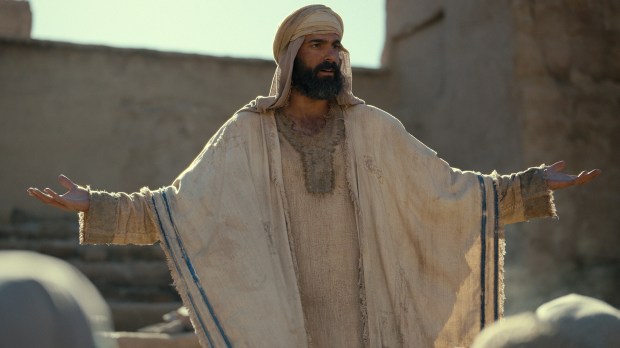
Courtesy of Netflix
The latest faith-based series, Testament: The Story of Moses . has recently been released on the streaming service Netflix. In three episodes each lasting around 90 minutes, viewers are taken on the ancient prophet’s journey through life, encountering his many trials and tribulations.
What is particular to this series is that the docudrama not only plays out the life of Moses, it also brings in opinions from leading theologians from the three monotheist religions, as well as experts in Egyptology and other relevant areas of research. And through the life of Moses and the commentary we can get an understanding of how such an ancient character from the Bible is particularly relevant today.
One of the series producers, Kelly McPherson, took the time to talk to Aleteia about the project, and shared his thoughts on how the series is particularly relevant today, and what makes this televised version of Moses’ life a little different from the familiar versions we’ve already seen on our screens.
What was the hardest thing about bringing the life of Moses to our screens in just under five hours? And how is this adaptation different from others?
The toughest thing, other than getting it finished, was we wanted to do something that had all the touchstones for people of faith. That they would feel like this is a story, even if there was a little bit of a different approach in certain ways, but that this is a story that they loved and recognized and felt the connection to. But also have it appeal to people who were not necessarily people of faith, and people of different spiritual feelings or backgrounds.
So something that felt universal because it feels like the message in all of it is very universal… we wanted something that wasn’t watered down… while also being respectful to the text, and to the story, to different people’s interpretations of it. We had consultants from every major religion and even an Egyptologist.
I’ve done quite a few historical documentaries and docudramas, but it was a lot more people to get input from. And it was all valuable. At the end of the day, I was surprised at how much overlap there was in the stories in different religions. And also how everybody really embraced it. I wasn’t sure how that was going to go… because you have a lot of different viewpoints.
So the most difficult things was to make something that was accessible, entertaining, and universal, but that still felt special and kind of appealed to people of various walks of life.
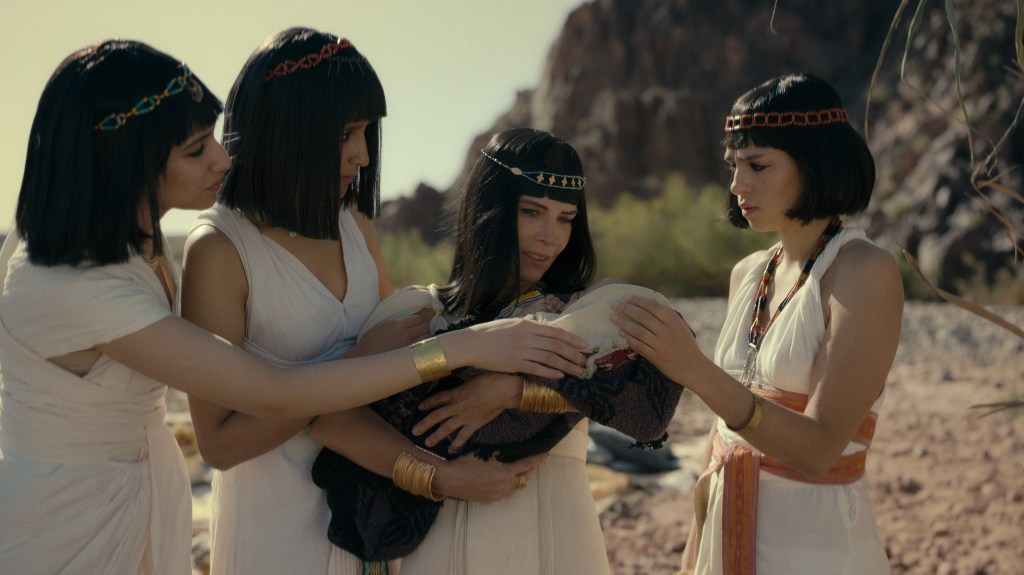
Were there any conflicting opinions?
No, I think that’s the thing that was surprising. I mean you get different opinions but I think that can vary in one faith. You know: “When did Moses know that he was a Hebrew? When did he learn about his brother, Aaron?” Some people say he learned it from an early age, some people said he knew it later. So those were just different viewpoints. [But we then had to consider] “How do we reveal this?” so that was a little tricky.
In this series we really see the man behind the prophet; we can see all the emotions. Avi Azulay, who plays the lead role, portrays him so well. How did you go about casting the role of Moses? What were you looking for?
That was the hardest role to cast, and it took the longest. We were looking for somebody who could bring across that darkness in Moses, but yet you could also see once he started evolving into this role of prophet he could be inspirational and could light people up at the same time, while also having this dark and kind of tortured past and having this burden placed upon his shoulders that he would have to be superhuman, or borderline superhuman, to take that on.
I mean I know that’s still an understatement. There’s nothing I could say that won’t be an understatement from what he was tasked with. But I think it was somebody that could be both inspirational and charismatic, but also have that brooding, that interior life that was a little bit haunted. And finding somebody that could bring both of that out is hard. Acting is a difficult thing…. Avi just jumped out at us.
He comes from a theater background. He has this kind of dynamic presence and this ability and I think he kind of takes command.
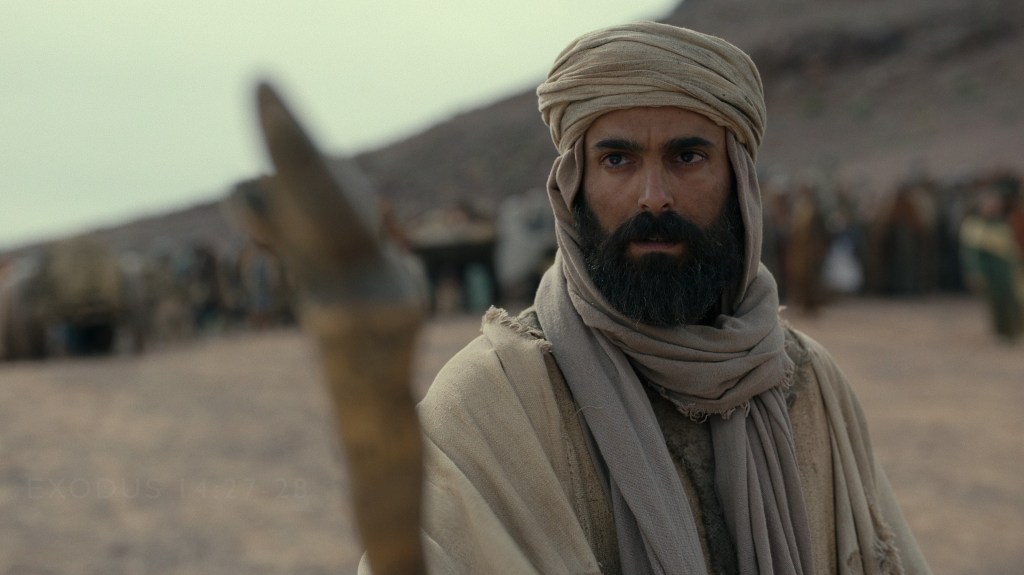
Faith-based series are proving very popular at the moment. The Chosen has had huge success. Any ideas why that might be?
I think it’s comforting to people. I think the message in so many of these stories is, and I think there’s also the connection that a lot of people come to these with memories from childhood. You may have grown up with a story, and you know how it begins, how it ends… but I think there’s something comforting in that. And I think that in every generation you think our world is coming apart at the seams. And I think that’s definitely a feeling in the present day world. There’s so much madness and things going on. That people are looking for comfort and they want to be entertained, too.
I think the telling of these stories has gotten better and better. What we wanted to do was make this story feel very rooted in the time and place it was set. But also make it feel contemporary and something that would still grab people who are also big consumers of dramas and films… The side of Moses that we went into, we started from the inside out with him: Who is he; what drives him; what scares him; what haunts him; what regrets does he have; what little things does he hold onto to that keep him going?
If we can dig into his flaws and the things that become his virtues, that makes him more human, that makes him more accessible to people. And people may not be tasked with leading an entire population to freedom… but everyday struggles in life, you can relate to it… And if people can tap into that then we feel that we have succeeded, then they’re on board to follow this guy because they can see themselves in him and vise versa a little bit.
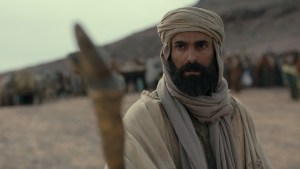
Articles like these are sponsored free for every Catholic through the support of generous readers just like you.
Help us continue to bring the Gospel to people everywhere through uplifting Catholic news, stories, spirituality, and more.

- Skip to main content
- Keyboard shortcuts for audio player
Author Interviews
Garrard conley's novel "all the world beside" combines faith and love.

Jordan-Marie Smith

Courtney Dorning

Ari Shapiro
NPR's Ari Shapiro talks with author Garrard Conley about his new novel All the World Beside.
ARI SHAPIRO, HOST:
The author Garrard Connelly has spent his life exploring the overlap between Christianity and sexuality. His bestselling memoir, "Boy Erased," was adapted into a 2018 film about undergoing conversion therapy.
(SOUNDBITE OF FILM, "BOY ERASED")
LUCAS HEDGES: (As Jared Eamons) I broke up with Chloe. We broke up because I think it's true about me. God help me. I think about men.
SHAPIRO: His new book comes at similar themes from a very different angle. "All The World Beside" is a novel set in the 1700s. It's a story of forbidden love between two married men in a small Massachusetts town. Garrard Conley, welcome to ALL THINGS CONSIDERED.
GARRARD CONLEY: Thanks so much for having me.
SHAPIRO: The two men at the center of this story, Nathaniel and Arthur, are not just townspeople. They are pillars of the community. Nathaniel is the minister who founded the town. Arthur is the doctor. Why did you want to build this story around characters of such prominence?
CONLEY: Well, I mean, raising the stakes is always good for a story. But really, the real reason is I've been attracted to this idea of leadership for a long time. You know, my father is a missionary Baptist preacher. He commands about 200 people every Sunday, and I've always watched that burden on him with fascination. I always wondered how he did it, and I guess that's where the idea came from.
SHAPIRO: And so how much of your father is in the character of Nathaniel?
CONLEY: Well, I think there's a lot of my father in Nathaniel. Nathaniel is very stubborn, but he's also very brilliant. And he's very conflicted about what he believes. I mean, so much of the novel is really about the challenge between the union of the head and the heart. And I think religion and sexuality often gets placed in that dichotomy where, you know, OK, we've got to do the right thing. We should do the right thing. But what do we really feel? And they don't have to be in conflict.
SHAPIRO: Do you think your father sees this or would see this as an honor, as a tribute, as sort of a paean to him, or how - I don't know. How has he responded, if he's read the book?
CONLEY: Well, you know, he says he's never read my first book...
SHAPIRO: Wow.
CONLEY: ...Which I do not believe in the least.
SHAPIRO: Which, just to remind people, was a memoir...
CONLEY: Yeah.
SHAPIRO: ...About your upbringing in this very conservative Christian tradition.
CONLEY: Mmm hmm. And, you know, my father, who's a preacher, sent me to conversion therapy, and he claims he never read it. I don't believe that's true. We joke about it. I know it sounds odd, but we've had, you know, struggles for many years. And one thing he said not too long ago was, hey, when are you going to write a book my congregants can read? And I said to him, well, I already have. They can read it at any time - I mean, as long as the books aren't banned, which they kind of are in so many states. But, you know, I think that it's a challenge for him to read it. And I want him to read it because it's written in a spirit of Christianity, honestly, and a spirit of compassion and forgiveness.
SHAPIRO: And you're clearly so literate in the language of Christianity and the Bible. And although you may have renounced the specifics of your upbringing, the ethos of that tradition is so thoroughly woven through this book. I mean, there are Bible passages that made me wonder why you chose a particular one for a particular scene. Can you can you give us an example?
CONLEY: Yeah. Early on in the book, we have several Bible passages, most of which are referring to grapes withering on the vine, which are a little bit of foreshadowing for many of the characters. But I inserted this one passage midway through the book, when the two men explore each other a bit more, and I can read that for you real quick.
SHAPIRO: Sure. Yeah.
CONLEY: It's the one about Jonathan and David, which...
SHAPIRO: Oh, this is like, if you want a gay Bible passage, Jonathan and David is the one you go to. Even I know that.
CONLEY: I know. It's a little on the nose.
SHAPIRO: It's a little on the nose.
CONLEY: But I felt like it was appropriate. I felt like it was appropriate 'cause these men would be thinking, you know, what is the most obvious example, right? So you have the Greeks in history, but when you're looking at the Bible, Jonathan and David are where you go. And so one of the characters quotes to the preacher, "I am distressed for thee, my brother Jonathan. Very pleasant hast thou been unto me. Thy love to me was wonderful, passing the love of women."
So it does seem really obvious there that these two men are discussing love in a way that goes beyond heterosexuality. And actually, in that scene, Nathaniel, our preacher - he disagrees with that interpretation that his lover is telling him. He says we shouldn't look for ourselves in the Bible that way. And so much of the way I was taught to read the Bible ignored some of the really obvious things that spoke to me. You look at the "Song Of Solomon," which is a book that is incredibly erotically charged. Anytime sensuality works its way into the Bible, people try to ignore it or, you know, there's that head-versus-heart moment again.
SHAPIRO: Yeah.
CONLEY: And when these two men discuss the Bible verse, it's very much like a real discussion I've had with people who are queer and who are dealing with their faith in this way.
SHAPIRO: But it's so interesting because, as these characters in the 1700s are looking for traces of people like them in the Bible, you in the present day went looking for traces of people like yourself in the 1700s.
CONLEY: Yes. I mean, it was such a challenge. My husband actually gave me the challenge when, one day, he just said, why don't you write about queer Puritans? Just go back to the source of it all. And I thought that was insane. I was like, there's...
SHAPIRO: (Laughter) Why did you think it was insane?
CONLEY: Well, I just thought - I saw, as a writer, how much work that was going to be, right? So I was thinking, how do I figure out how people spoke to each other back then in a way that was natural to be that way?
SHAPIRO: So this book does deal with similar themes to your memoir, but in very different ways. It's a novel. It's set in the 1700s. Did writing these characters and this plot help you understand your own story any differently?
CONLEY: Oh, yeah. I mean, with "Boy Erased," it was actually obviously autobiographical. It was very real. But this book, to me, feels even more autobiographical because, with memoir, you're trying to protect some of the people that are still alive, right? But in fiction, you can really dive into some dicey territory and hide behind that screen. So there are a lot of discussions in the book that are very autobiographical. You know, the lovers' discussion in the middle of the book - they could almost be word-for-word discussions that I've actually had with people. And, of course, this...
SHAPIRO: You mean about, like, do we leave our society and...
SHAPIRO: ...Our culture to be with each other, or do we confine ourselves to the limitations that we've been given?
CONLEY: Yeah. And then also, how do we see ourselves in Christianity? Do we see ourselves there at all? And I think those are questions that I've always dealt with. And because of that, I was able to go deeper into many of these characters' thoughts than I feel like I would have been comfortable doing in my own life.
SHAPIRO: Hmm. Do you still, today, see yourself as a Christian?
CONLEY: You know, I think that I'm still on a faith journey. For me, writing this book drew me back into my faith quite a bit, and some of my friends were very concerned with the way I was talking because, you know, it never really leaves you. Just, like, the knowledge of all these Bible verses that I casually included in the book - you know, I could just remember them. I have them memorized. You know, it's so much a part of my life, this faith. But I do believe that I have a more expansive vision. You know, I think I'll probably always have faith. I'll probably always believe there's something, but certainly not just within Christianity anymore.
SHAPIRO: Garrard Conley's new novel is "All The World Beside." Thank you so much.
CONLEY: Thank you.
(SOUNDBITE OF SEAN ANGUS WATSON'S "WALTZ IN SWEATERS")
Copyright © 2024 NPR. All rights reserved. Visit our website terms of use and permissions pages at www.npr.org for further information.
NPR transcripts are created on a rush deadline by an NPR contractor. This text may not be in its final form and may be updated or revised in the future. Accuracy and availability may vary. The authoritative record of NPR’s programming is the audio record.
Belief Beyond Sight: Kayla Jenkins The Blind Chick
Walking by Faith, Not Sight: Kayla Jenkins' Inspiring Journey on The Blind Chick Podcast In this episode of 'The Blind Chick,' hosts Moses and Penn Street bring to the fore stories of resilience and the triumphs over life's hurdles, particularly focusing on living with vision impairment. The narrative unfolds with Moses and Penn encouraging audience engagement through feedback and announces the addition of a new podcast, 'Game Changers,' about adaptive sports. The highlight of the episode is an inspiring conversation with guest Kayla Jenkins, a young woman who, despite an aggressive form of glaucoma that led to significant vision loss, earned her law degree and is pursuing seminary studies. Jenkins, the youngest of twelve siblings, shares her journey from aspiring lawyer to founding Blind Faith Ministries, a platform rooted in faith and resilience against adversity. Throughout, the hosts and Jenkins touch upon the importance of self-advocacy, the distinction between sight and vision, and the role of faith in navigating life's challenges. The episode not only sheds light on Kayla's personal journey and aspirations but also discusses broader themes of adaptation, support, and the impact of loss on life's path. Chapters 00:00 Welcome to The Blind Chick Podcast! 00:45 Engaging with Our Audience: Feedback and Announcements 01:32 Introducing Game Changers: A New Podcast on Adaptive Sports 02:00 Don't Miss the Audio Trekker Hike Event! 03:11 Meet Kayla Jenkins: Law Graduate and Seminary Student 05:02 Kayla's Love for Vintage Fashion and Overcoming Vision Challenges 07:13 Finding Personal Style with Vision Loss 08:36 Kayla's Family Background and Hereditary Glaucoma 10:04 Kayla's Journey to Becoming a Lawyer 11:42 Facing Vision Loss During Law School 14:55 The Birth of Blind Faith Ministries 20:16 Kayla's Vision for Blind Faith Ministries and Being a Light for Others 24:58 Final Thoughts and Gratitude Thank you for listening to this episode of The Blind Chick. If you would like to make a comment or suggest a guest or have questions for Penn or Moses, please call us at 720-712-8856 or email us at [email protected]. Have a great week.
- More Episodes
Top Podcasts In Education
Advertisement
Wake forest cornerback caelen carson's journey of football and faith, share this article.
In many ways, football embodies life.
It’s rough. You get thrown around. You’re going to have to figure out everything around you while simultaneously being surrounded by moving parts. It’s about adapting to your surroundings and making the best of it, no matter how dire they may be.
No one knows that more than Wake Forest cornerback Caelen Carson.
The youngest of eight siblings, Carson went from the small town of Waldorf, Maryland to being one of the best cornerbacks in college football. But it was in the streets of his hometown that Carson found the love for football.
“I started [playing] when I was five years old,” Carson said. “And really it started before that because I was playing outside with the older kids just because my siblings were older. But what made me fall in love with the game was my older brother, Antonio.”
Carson credits his older brother for a lot of his development from such a young age, and helping him get a head start at enhancing his talent.
“He took me everywhere he went. And when we’re playing in the streets, we’re playing sideline pop. So once you get near the sideline, or the edge of the street, you’re gonna get a little shoulder bump. So I had older kids hitting me, and when we played in grass you get tackled. So if I cried, he’d tell me to go in the house. But I wanted to keep playing, and I wanted to be like him so much. So I’d go inside, calm down, and be back out five minutes later to go play.”
Antonio didn’t have a career in football. Rather, he lived vicariously through his younger brother.
“He didn’t play in high school or anything,” Carson said. “He just lived his dream through me.”
Things for Carson were far from easy, though. While the Wake Forest star has grown to make a name for himself as one of the most dominant players in the ACC, the road he travelled to get there was far from illustrious.
“I come real humble beginnings,” Carson said. “When I was real young, me, my mom, and four of my siblings were driving on the night of Christmas Eve. My mom fell asleep at the wheel and we hit a tree. The car caught on fire, and luckily this man had seen everything and helped me and my siblings out, but part of the car was trapping my mom in the driver’s seat. The ambulance and everything showed up, and they were able to get my mom out and fly her to the hospital, but she lost her leg.”
While his mother lost her leg, she was given a prosthetic and still able to live a normal day-to-day life, usually working two jobs. Carson highlighted resilience as the No. 1 lesson he has learned in life, and how is mother’s constant ability to overcome adversity provided a constant example on how to be resilient.
“My mom had her first kid at 13,” Carson said. “So her entire life has been about overcoming a lot of obstacles.”
Carson was asked about resiliency, and named his mother as the biggest example of being resilient.”
“They said she couldn’t raise 6 kids by herself… she did it,” Carson wrote. “They said she wasn’t going to make it after the car accident… she did it. They said she was never going to be able to walk again… she did it. Resilient!!”

Carson leaned on that resilient nature throughout his childhood and high-school years.
“Going from my middle school to high school was tough,” Carson said. “The middle school and high school I went to were in different counties. So in middle school, most of the kids were in similar situations as me- not a ton of money and certain things would happen there that wouldn’t fly when I went to high school. And not everyone in high school came from money, but it was definitely a big difference there compared to middle school when it felt like everyone was going through the same things. And I’d see other guys before we did went to the weight room warming up their food beforehand, and I’d be the only guy with no food to heat up. And my coach used to have to pick me up and take me to practice because my mom was at work.”
With several obstacles already in his path, Carson would have to go through them all without his supportive older brother by his side. In his sophomore year of high school, Antonio was arrested and charged with murder.
“At that time, I didn’t want to play football,” Carson said. “I was already at a low point because I wasn’t starting. It was my first year at corner, and I was competing for the job. I had a bad scrimmage where I got beat a lot. The next scrimmage, I wasn’t starting. And when I did get in the game, I got into a fight on the field and was suspended for a week. So I couldn’t play in Week 1. And I couldn’t talk to my brother about it because after he got locked up, I couldn’t talk to him for over a year. I told my friend I was done. Not a lot of people know that, my brother doesn’t know that. But yeah, at the time I was like ‘I’m done with this.’ But once he was sentenced, there was a lot of crying in my room at night. My sister was locked up, too. There was no one for me to run to. But I really feel like all of that helped make me who I am.”
While his life at home and on the field were in somewhat of a tailspin, Carson stayed on the path. In two years as a defensive back at North Point High School, he became one of the best defensive backs in the state of Maryland and earned an All-Southern Maryland selection.
Carson gives a lot of praise to his high school coach, Tom Petre, who went 69-14 as the head coach at North Point.
“Without him, would be no Caelen Carson,” he said. “I actually used to hide from him all the time after practice because if practice ended at five o’clock, I’d be there until seven. But I didn’t want him to see me there because it was embarrassing always waiting for a ride, always needing something. He probably doesn’t even know that, but yeah I used to hide but I’d always end up having to go back and be like “Yeah, I need a ride.”
Petre spoke with Touchdown Wire, and said that on top of his ability on the field, Carson was just as special and unique as a human being.
“With Caelen, it’s always been character,” Petre said. “He was quiet by nature when he was younger but once you gained his trust, there wasn’t a thing he wouldn’t do.
Petre adds that it isn’t just Carson’s talent that made him special, but his preparation that truly set him apart from others.
“Beyond skill, it was his competitive nature and ability to prepare,” Petre said. “He knew film and schemes and competed like crazy on both sides of the ball.”
That skill led to multiple offers at the collegiate level, but only one from a power five school- Wake Forest.
“I wouldn’t say I was a late bloomer, because I had the tape,” Carson said. “To be honest, I don’t know why nobody else offered me [a scholarship]. At first I thought ‘well maybe I didn’t do this or didn’t do that.’ But when I look at my tape, I’m just like ‘why wouldn’t anyone else offer me with that?'”
Amongst the other schools to offer Carson a scholarship were James Madison, Marshall, Eastern Carolina, and Temple. He had 15 offers in total, but ultimately chose to become a Demon Deacon because of how strongly they pursued him.
“For them to be my only power five offer, but still recruit me as if I had multiple other offers was what did it,” Carson said. “Like, they knew I was probably going to end up going there, but they still recruited me heavily and showed that constant interest and belief in me. They came to my school three times, they came to see me work out and run the 40. Other schools would just drop off an offer and leave, but Wake Forest was always there and making it known like ‘hey, we want you.'”
The Demon Deacons’ pursuit in Carson paid off, as he gave them four years of great cornerback play. In 2021, he allowed a passer rating of just 55.5 to opposing quarterbacks, per PFF, while intercepting two passes. As his career advanced, he began moving around the defense more, getting snaps on the perimeter and in the slot, as well as jumping up in the box. His 71.7 coverage grade was higher than the national average, and he showed willingness as a run defender and tackler, as well.
“From 2020 to 2024, I probably have the most film of anyone in terms of consistently not getting beat,” Carson said. “Like this year, against Notre Dame I gave up a post, and I didn’t have a great game against NC State. But I can sit here and pick out that post that I gave up because it’s not like I can sit here and name many other examples of me getting beat in coverage. If you go look at the tape, try to find a catch on a fade or a vertical that I gave up. I can’t name one. And when you watch the tape, take away the different factors like height and build- who’s been consistent? That’s what the name of the game is. And I’m not speaking on anyone, but it’s easy to pop off and have a good year. It’s about consistency.”
Carson also spoke about his versatility, and how that sets him apart from his other cornerback peers in this class.
“My best game was at nickel against Pitt,” Carson said. “And that was my first game ever playing nickel- I don’t think everyone has that versatility. It was something that came natural to me. I went into that game without ever taking a zone drop before. I basically had to learn on the job, and I played well.”
Carson also pointed out the top-tier talents he was tasked with covering, and how he was able to shut down that echelon of talents.
“I mean this in the most humble of ways, so I don’t wan anyone to take this wrong,” Carson said. “Dontayvion Wicks was the toughest matchup I had, and that was my sophomore year. He probably got the best of me in the first half, and in the second half I bounced back. I don’t have a game where I struggled from start to finish, and I don’t think many cornerbacks can say that.”
It is now just a matter of weeks until Caelen Carson hears his name called on draft day. When asked what that moment is going to bring emotionally, he said he just wants to give back to everyone that got him there.
“It’s gunna be a relieving feeling,” Carson said. “My mom will definitely be crying. She’s the strongest lady I’ve ever met. So for me to be able to tell her she won’t have to work anymore, that’s going to mean a lot to me. And outside of my family, I think it will mean a lot to my community in Waldorf. There’s been a few guys from the city to make it to the NFL, but they don’t really come back here. I want to be a representative of my city and be able to show kids in the area that you really can make it and be able to say ‘wow, if he can do it, that means I can do it.’ That’s the example I want to set. I just want to give people some hope and let these kids know they can do it.”
As we wrapped up our conversation, a light-hearted dialogue about tattoos began, as Carson has a respectable amount on his arms. He pointed to his right forearm, and shared a thoughtful story.
“The newest tattoo I got actually says ‘Only God can judge’ and “Faith over fear,” Carson said. “I’m trying to give my life to God more. Because a lot of this stuff really opened my eyes. All this stuff I told you, I wouldn’t say I was depressed, but I wasn’t the happiest. You may see someone like me who had four successful years at Wake and think that everything is glitter, but I didn’t feel that. So even though I had success on the field, if I were to get hurt, it would be everything I’m going through on top of being injured- it would just make everything worse and I’d get in real pissy moods. And I knew that this last year was a big year for me, and I just wanted to get into my Bible more.
“And I can honestly say if there are times when I do start to feel upset, it doesn’t last as long and it’s short-lived because I know I’m blessed and I’m thankful for the opportunities I have. Because someone didn’t wake up today, someone has it worse than me. Everybody has a story. And I decided to take my life from being not so happy all the time to living my best life regardless of what happens, regardless of what life throws at me. I know that there’s a higher-up somewhere.
“I know God’s got me, and I’m gonna keep going.”
Want the latest news and insights on your favorite team?
Sign up for our newsletter to get updates to your inbox, and also receive offers from us, our affiliates and partners. By signing up you agree to our Privacy Policy
An error has occured
Please re-enter your email address.
Thanks for signing up!
You'll now receive the top Touchdown Wire stories each day directly in your inbox.
Most Popular
2024 nfl mock draft: qbs go 1-2-3-4, trades galore in latest first-round forecast, 2024 nfl mock draft with scouting reports: bears go all in with major trade, the best pro football player to wear every jersey number, nfl draft: every quarterback who went no. 1 overall since 1967, the 101 greatest nicknames in football history, nfl post-free agency power rankings, the new nfl wwe title belts are here, check out your team's belt.
Please enter an email address.
Thanks for signing up.
Please check your email for a confirmation.
Something went wrong.

Paige Bueckers' faith and redemption: UConn's journey to the Sweet 16
The unyielding force behind UConn's pursuit of NCAA glory.
I n a whirlwind of determination and unwavering faith, Paige Bueckers stands at the precipice of redemption as she leads the UConn Huskies into the Sweet 16 clash against Duke in the NCAA Women's Tournament this Saturday.
Following a stellar performance, boasting 32 points in UConn's triumph over Syracuse , Bueckers unveiled a poignant revelation during her postgame address. Reflecting on her journey, she disclosed her fervent prayers from a year ago, earnestly beseeching to find herself in the very moment she now inhabits - competing in the Sweet 16.
" I prayed so hard a year ago today to be in my shoes where I'm at right now, so just to appreciate it ," she expressed, acknowledging the divine guidance that has shaped her path, as reported by HighlightHER on X.
Such profound faith has been an intrinsic part of Bueckers' narrative, transcending the confines of the basketball court. Vocal about her beliefs, she frequently shares scriptures and attributes her successes to the grace of God. Proverbs 3:5-6 adorns her Instagram bio, a testament to her unwavering conviction.
The journey to this pivotal moment has been marked by trials and triumphs, none more poignant than the adversity faced in August 2022 when Bueckers suffered a devastating ACL injury. Yet, amidst the anguish, her faith emerged as an anchor, guiding her through the tumultuous seas of rehabilitation.
" It's hard trying to make sense of it all now but I can't help but think that God is using me as a testimony as to how much you can overcome with Him by your side ," she shared in an Instagram post, illuminating her resilience in the face of adversity.
Acknowledging the support of her fans and the omnipresent strength derived from her faith, Bueckers remained resolute in her pursuit of her basketball dreams. " God put a dream in my heart and even if I have to walk through a nightmare to get it I'm going to keep believing ," she affirmed.
Bueckers' resilience shines: A testament to faith and perseverance
Six months post-surgery, Bueckers provided an update on her progress, echoing the sentiment that divine timing is immutable, reinforcing her unwavering resolve to persevere.
As the Huskies prepare to script another chapter in their storied legacy, Bueckers stands as a beacon of hope and inspiration, embodying the indomitable spirit of resilience and faith. Saturday's showdown against Duke not only signifies a quest for redemption but also an affirmation of belief - belief in oneself, in the team, and in the divine providence that guides their journey.
With the clock ticking towards tip-off, Bueckers and the Huskies stand poised to etch their names in the annals of basketball history, driven by an unwavering faith and an unyielding resolve to seize their moment of glory.
Don't miss out on all sports information at www.marca.com/en .

COMMENTS
A number of steps were involved in Moses' journey of faith. Rejection. First, Moses rejected his royal position: "By faith Moses, when he became of age [40 years old, Acts 7:23], refused to be called the son of Pharaoh's daughter" (Heb. 11:24). This decision was an act of faith.
Related Media. Moses' life began as a journey of faith - his parents' faith when they chose to trust God for the protection of their baby boy. His life continued as a life of faith as God led him step by step to carry out the purpose He had for Moses. My prayer as you study the life of Moses is that you would grow deeper in your own journey of ...
Explore the epic journey of Moses, from the Nile's basket to Mount Nebo's view, through 10 pivotal events that shaped his legacy and faith. ... As the Israelites experienced this incredible event firsthand, their faith in God and in Moses as their leader grew exponentially. The parting of the Red Sea became a defining moment, demonstrating God ...
Hebrews 11:23-29. Moses' life began as a journey of faith - his parents' faith when they chose to trust God for the protection of their baby boy. His life continued as a life of faith as God led him step by step to carry out the purpose He had for Moses. No, Moses wasn't perfect, but that didn't prevent God from using him.
Notice how negative situations were used for good in God's plan. When you become discouraged by your own difficult circumstances, be encouraged as you study the life of Moses and his journey of faith, knowing that God can use even your difficulties and failures as He does His work in and through you. Day 1: The Background
Moses: His Faith and Decision. "By faith Moses, when he was come to years, refused to he called the son of Pharaoh's daughter; choosing rather to suffer affliction with the people of God, than to enjoy the pleasures of sin for a season; esteeming the reproach of Christ greater riches than the treasures in Egypt: for he had respect unto the ...
Moses takes the risk of faith. All that God has given him is a promise, and yet he acts on that promise. ... "Exodus: The Journey of Faith," The Great Themes of Scripture, tape 3 (St. Anthony Messenger Tapes: 1973). Story from Our Community: These Daily Meditations are the first thing I read every day. I not only read the meditation but ...
Moses (flourished 14th-13th century bce) Hebrew prophet, teacher, and leader who, in the 13th century bce (before the Common Era, or bc), delivered his people from Egyptian slavery.In the Covenant ceremony at Mt. Sinai, where the Ten Commandments were promulgated, he founded the religious community known as Israel.As the interpreter of these Covenant stipulations, he was the organizer of the ...
The story of Moses is one of the most well-known and significant in the Bible. With his unwavering faith and guidance from God, Moses led the Israelites out of slavery in Egypt and into the Promised Land. In this article, we will explore the life of Moses, the challenges he faced, and the lessons we can learn from his story.
So, now we look at Moses, and Moses made the right choice. He chose God's way. He chose to believe God, to believe the revelation of God, the Word of God, to live a life of faith. And his faith is demonstrated in his decisions, the decisions that related to things he rejected and things he accepted.
Moses' life was one of faith, and we know that without faith it is impossible to please God (Hebrews 11:6). Likewise, it is by faith that we, looking forward to heavenly riches, can endure temporal hardships in this lifetime (2 Corinthians 4:17-18). As mentioned earlier, we also know that Moses' life was typological of the life of Christ ...
God needs humble people. God used Moses' 40 years in the wilderness to teach him the important lesson of humility. As he cared for sheep, he learned to trust in God's plans instead of trusting his way of doing things. He also learned the importance of being teachable and taking advice from others (Exodus 18:14, 17).
This awakening connotes self-drive. While Abraham responded to God's call with a leap of faith, Moses was motivated from within. Abraham's journey began without a clear sense of what was to unfold. With Moses, we encounter a leader inspired by a clarity of purpose and mission honed through decades of relationship with both God and his people.
The journey of Moses is a timeless narrative that reminds us of the transformative power of faith, the importance of perseverance in the face of adversity, and the capacity for individuals to rise ...
Unwavering Faith: Moses' Calling and His Miraculous Signs Despite his initial doubts and fears, Moses answers God's call, showing us the power of faith, obedience, and divine intervention. This chapter serves as a reminder that God often uses the most unlikely individuals to carry out His divine plans, assuring us that He is with us, even in ...
V. The Journey in the Wilderness to Sinai. At Marah and Elim. 22 Then Moses led Israel forward from the Red Sea, [] and they marched out to the wilderness of Shur. After traveling for three days through the wilderness without finding water, 23 they arrived at Marah, where they could not drink its water, because it was too bitter. Hence this place was called Marah.
By faith they passed through the Red Sea…" Hebrews 11:23-29. Moses' life began as a journey of faith - his parents' faith when they chose to trust God for the protection of their baby boy. His life continued as a life of faith as God led him step by step to carry out the purpose He had for Moses.
Joshua continued Moses' journey and led the Israelites across the Jordan River and into the promised land. Thoughtfully Gourmet, Tea Affirmations Christian Prayer Gift Set, Includes 6 Flavours of Tea with Bible Verses from Psalms and Other Books to Rejoice, Pack of 90 ... Moses' profound faith and resolve, manifested through his numerous ...
Faith and Obedience: Moses' unwavering faith and obedience are central to this passage. ... It invites us to reflect on our own journey of faith, recognizing that God's plans often surpass our understanding. Just as Moses trusted in God's guidance, we too can navigate life's challenges with the assurance that He is with us every step of ...
Moses' Self-doubt (Verses 10-12) Moses expresses his self-doubt regarding his ability to convince Pharaoh, given his unskilled speech and the Israelites' lack of faith. Charge to Moses and Aaron (Verse 13) God reaffirms His charge to Moses and Aaron to liberate the Israelites from Egypt. Lineage of Leaders (Verses 14-29)
10 Stages In A Faith Journey. Here's a detailed breakdown of 10 stages in a faith journey, complete with Scripture and practical advice for each stage: Scripture: "Ask, and it will be given to you; seek, and you will find; knock, and it will be opened to you.". - Matthew 7:7. Advice: Stay open-minded.
The latest faith-based series, Testament: The Story of Moses. has recently been released on the streaming service Netflix. In three episodes each lasting around 90 minutes, viewers are taken on ...
A new biblical miniseries brings the familiar story of Moses to millions of viewers on one streaming platform this Holy Week. Netflix's " Testament: The Story of Moses ," is a three-part docudrama ...
The journey of faith for Moses was soon to end. It was now time for him to close the "book" on his earthly life. Looking To God's Word. Deuteronomy 3:23-29 . 25. How did Moses describe his interaction with God and God's response concerning the issue of crossing over into the land?
CONLEY: You know, I think that I'm still on a faith journey. For me, writing this book drew me back into my faith quite a bit, and some of my friends were very concerned with the way I was talking ...
Walking by Faith, Not Sight: Kayla Jenkins' Inspiring Journey on The Blind Chick Podcast In this episode of 'The Blind Chick,' hosts Moses and Penn Street bring to the fore stories of resilience and the triumphs over life's hurdles, particularly focusing on living with vision impairment. The narr…
No one knows that more than Wake Forest cornerback Caelen Carson. The youngest of eight siblings, Carson went from the small town of Waldorf, Maryland to being one of the best cornerbacks in college football. But it was in the streets of his hometown that Carson found the love for football. "I started [playing] when I was five years old ...
Cabinet Secretary for Public Service, Moses Kuria, recently shared his support for Raila Odinga's bid for the position of African Union Commission Chairperson. Kuria recounted a gracious gesture ...
Day 1: The Grumbling Begins. We ended last week with a high point in the lives of the sons of Israel and Moses. God had delivered them. They were free from bondage and ready for a new life in a new land. They were praising God and singing songs to Him…until there was a slight problem. There was no water to drink.
The unyielding force behind UConn's pursuit of NCAA glory. In a whirlwind of determination and unwavering faith, Paige Bueckers stands at the precipice of redemption as she leads the UConn Huskies ...